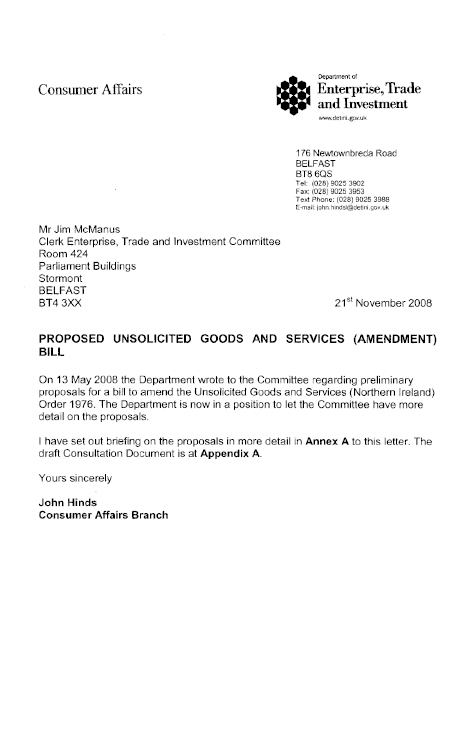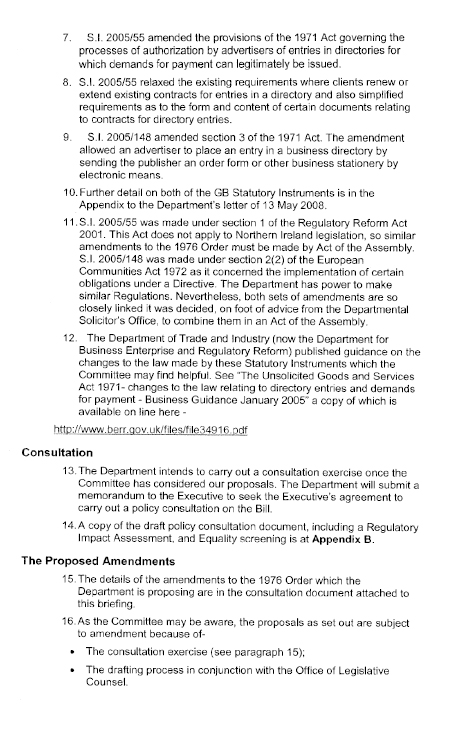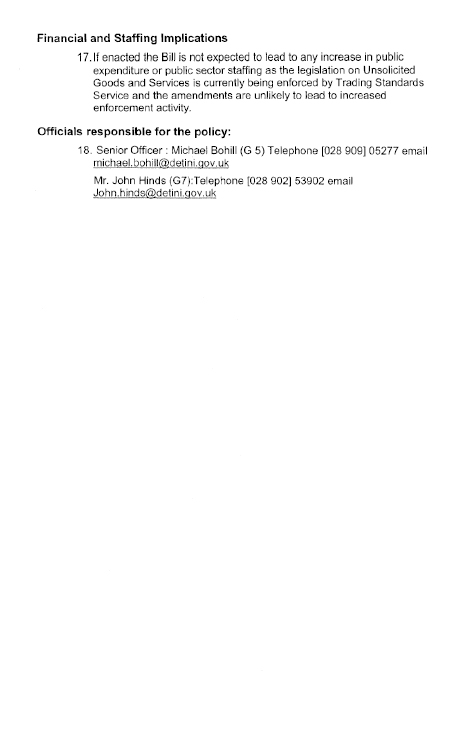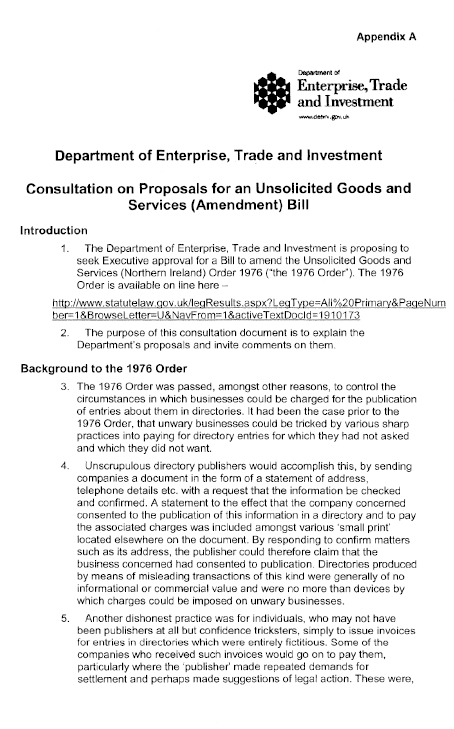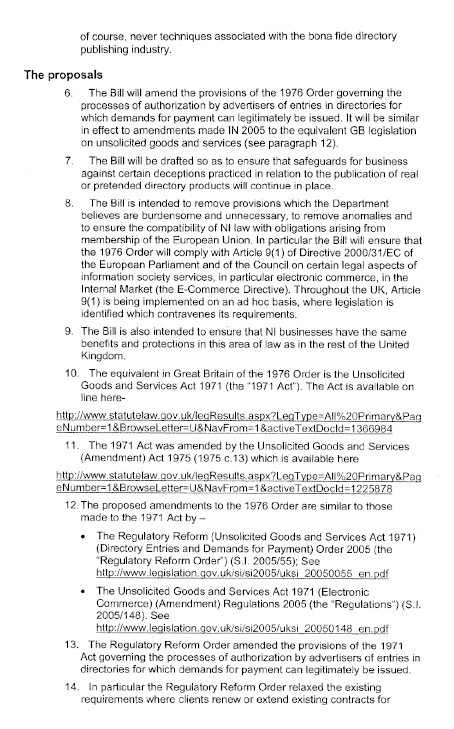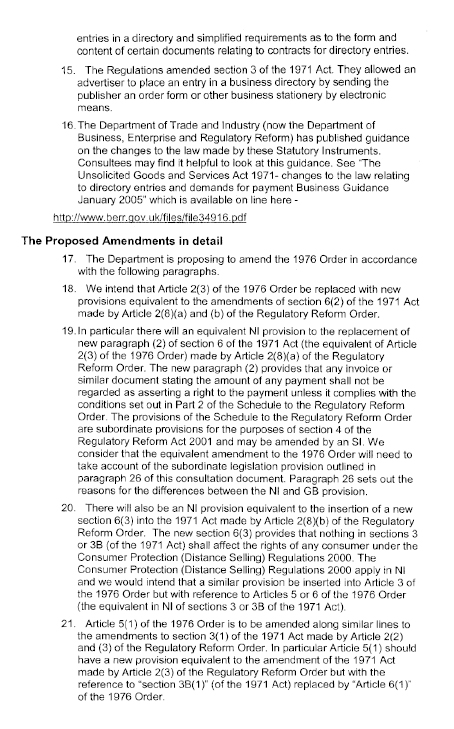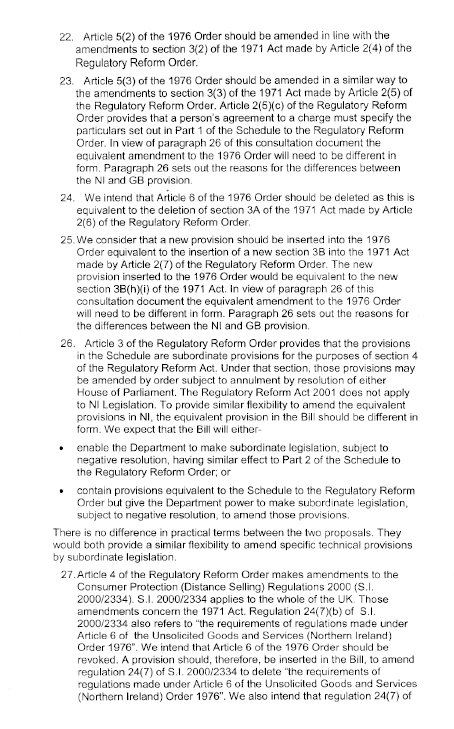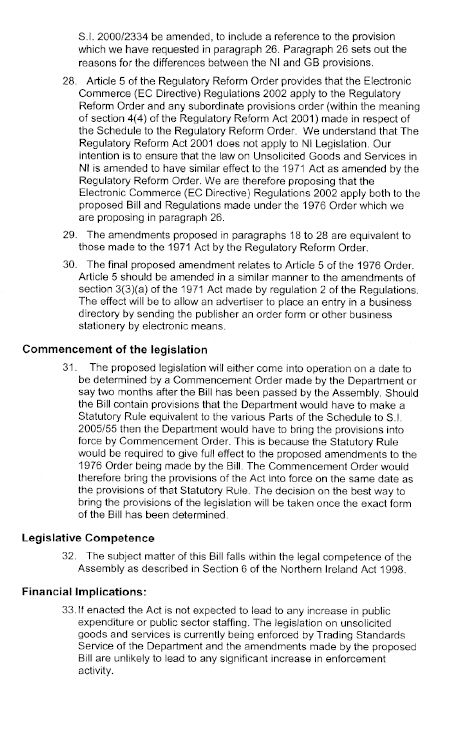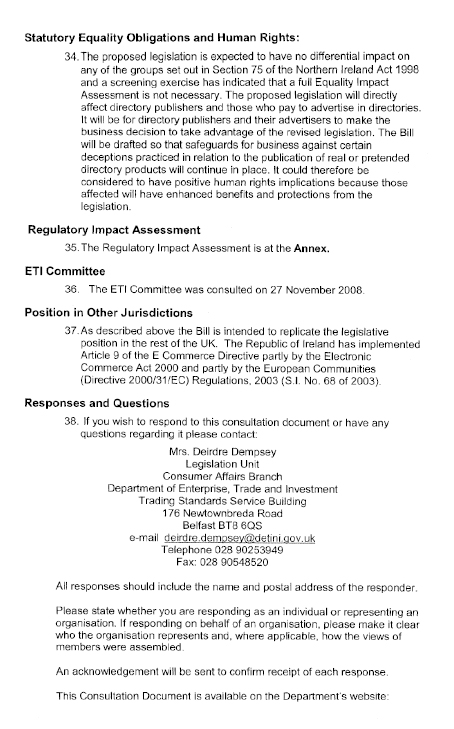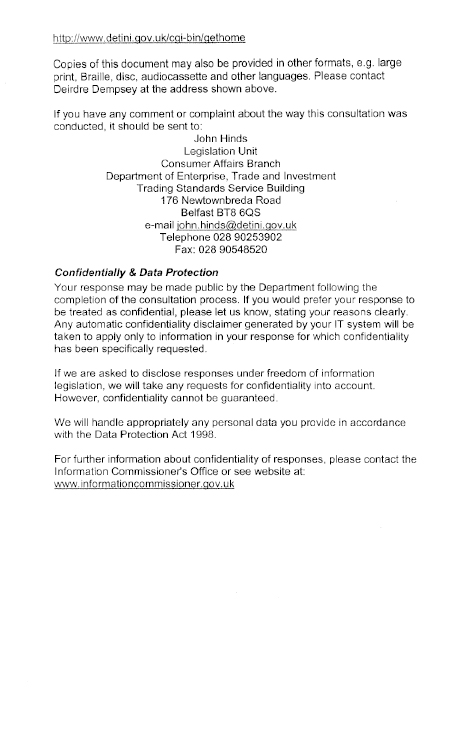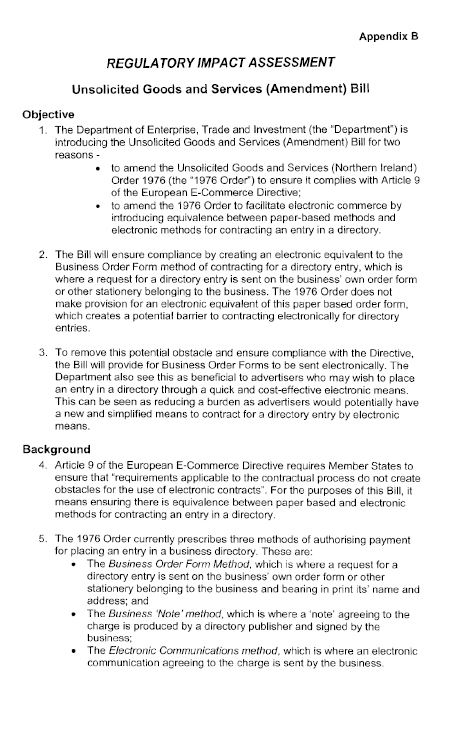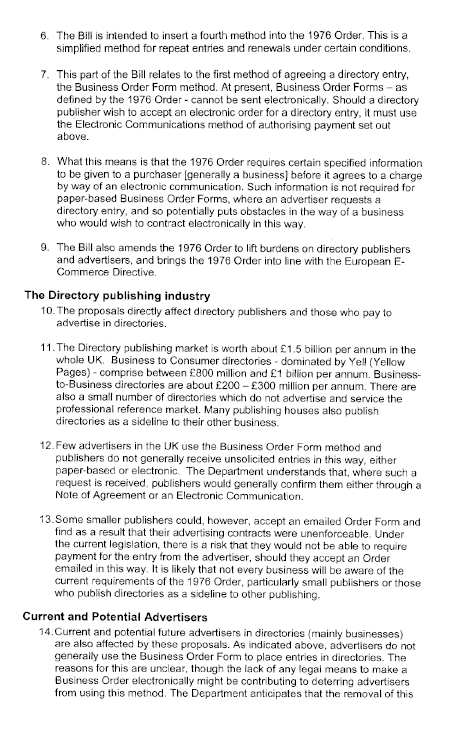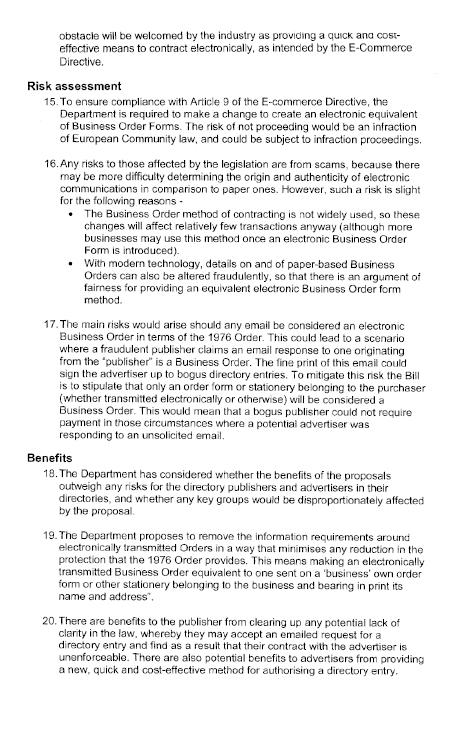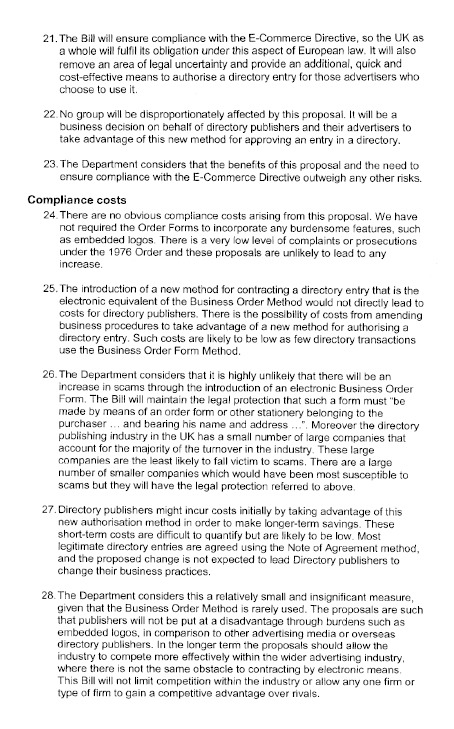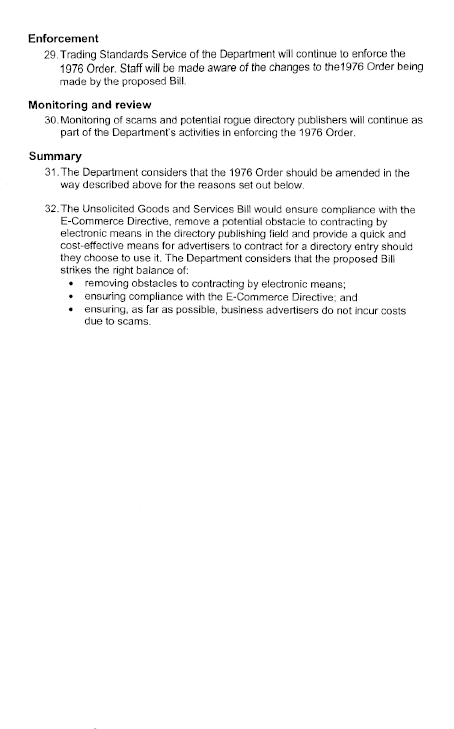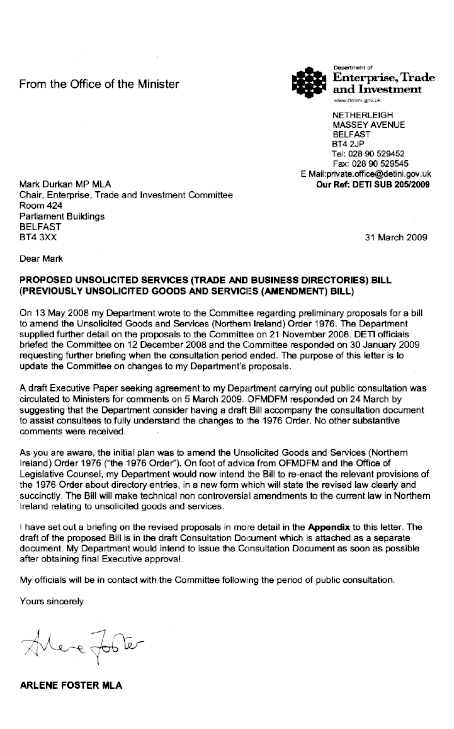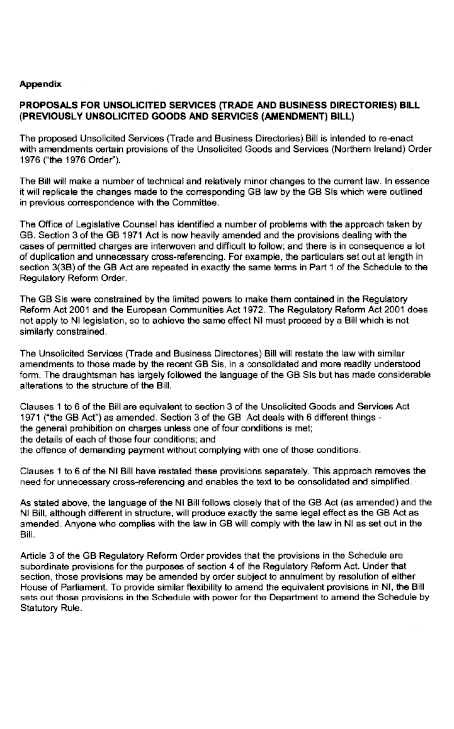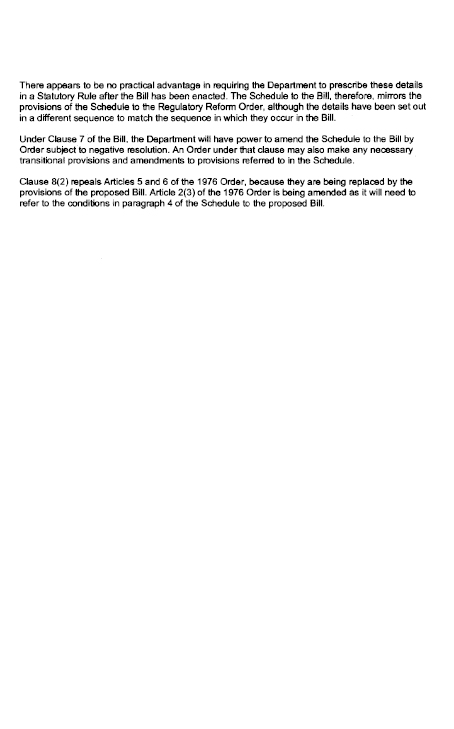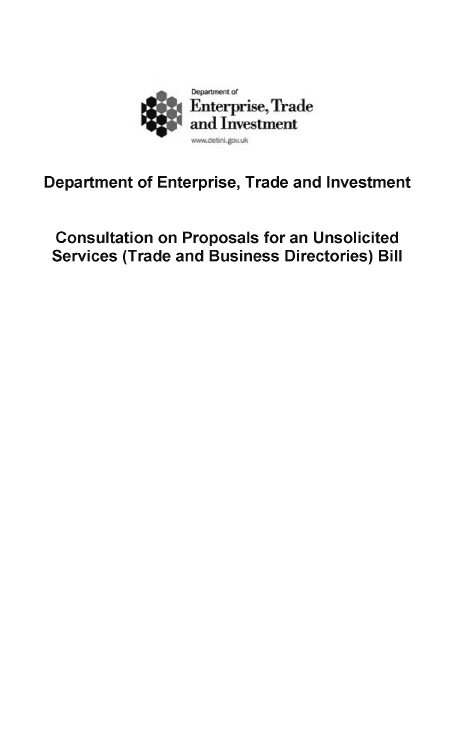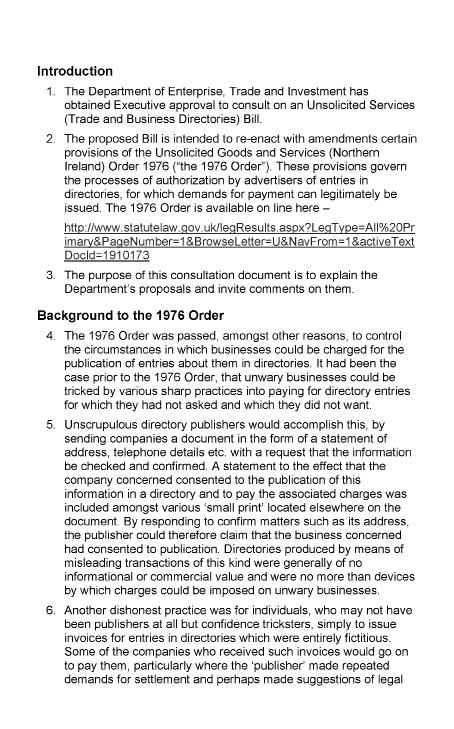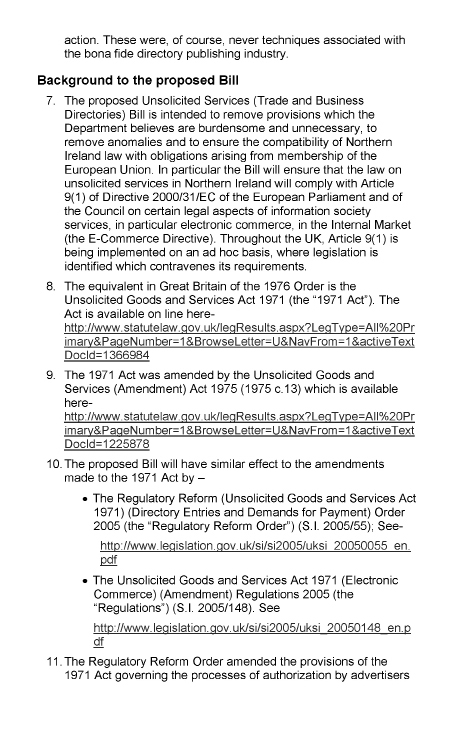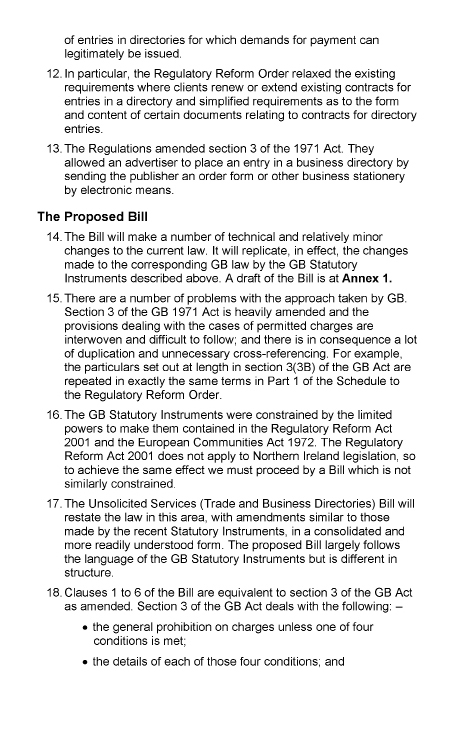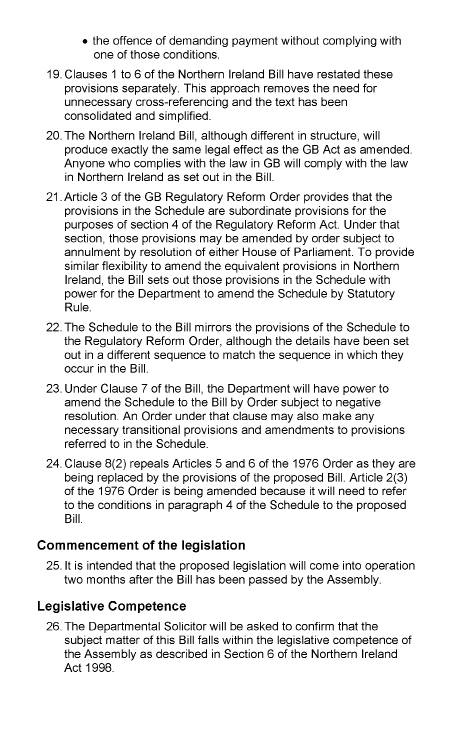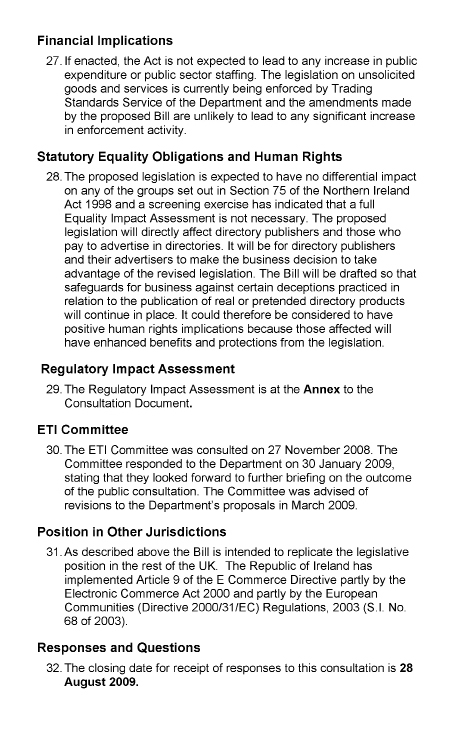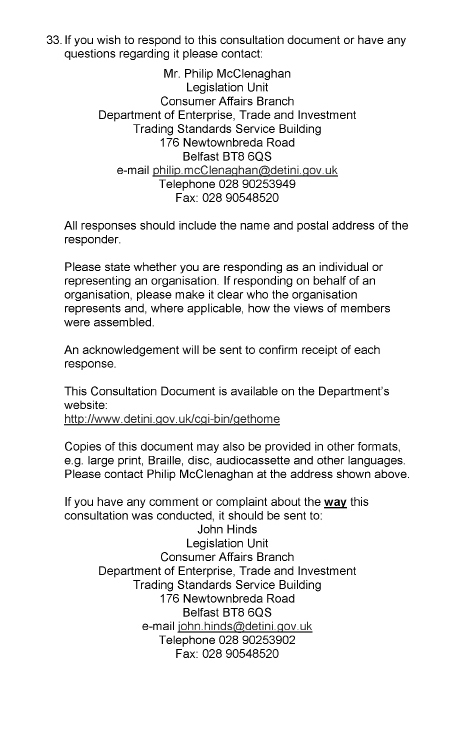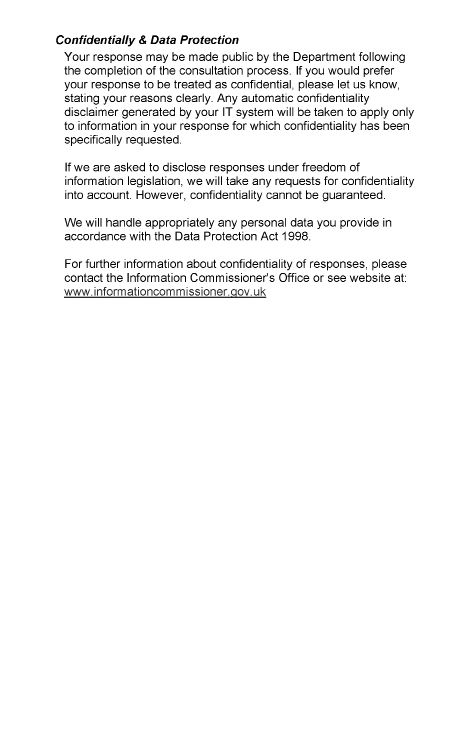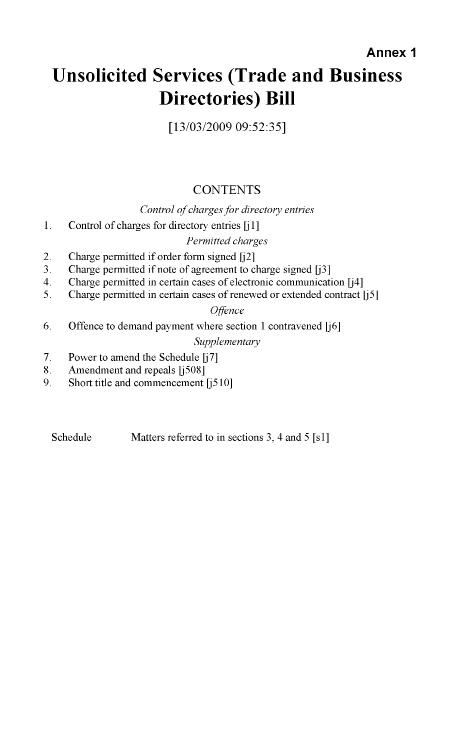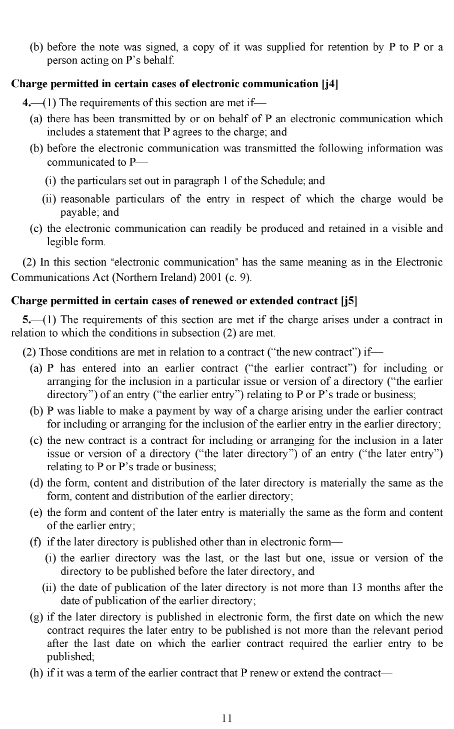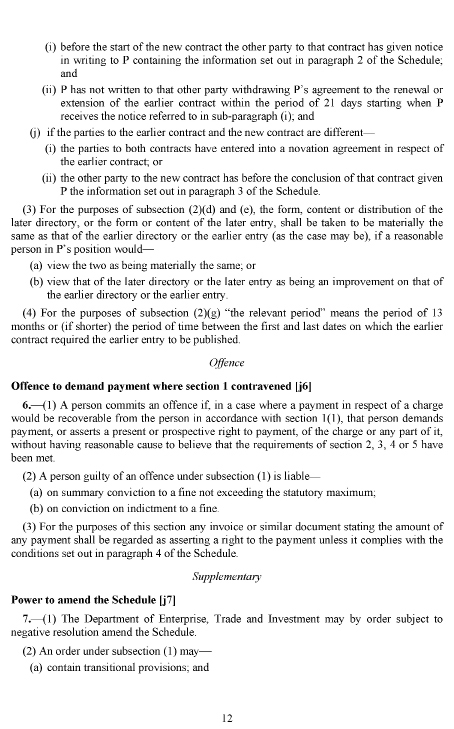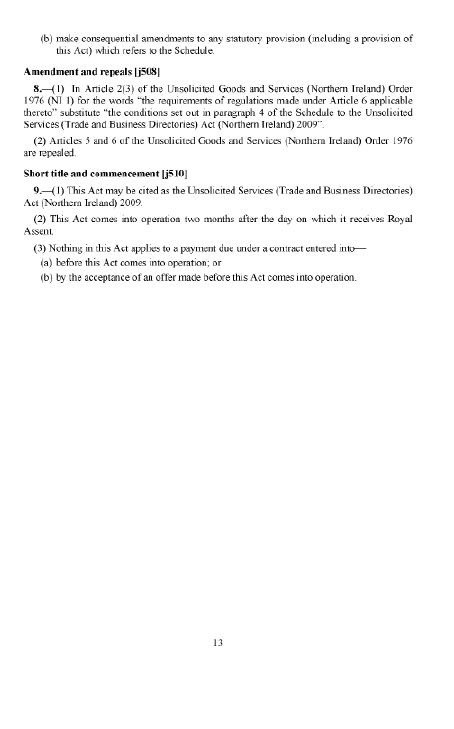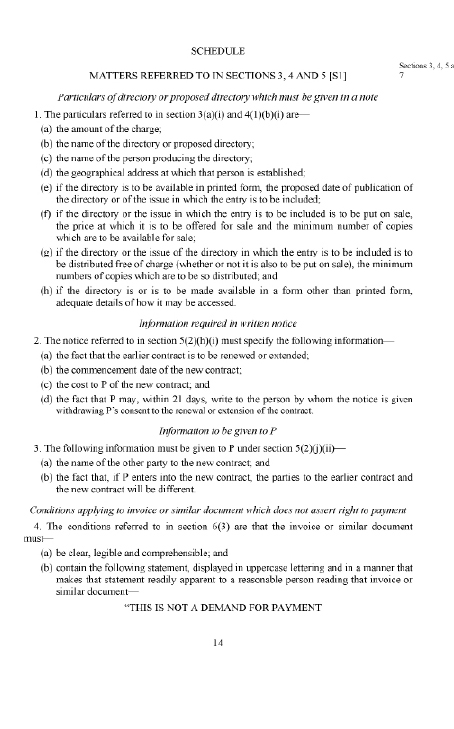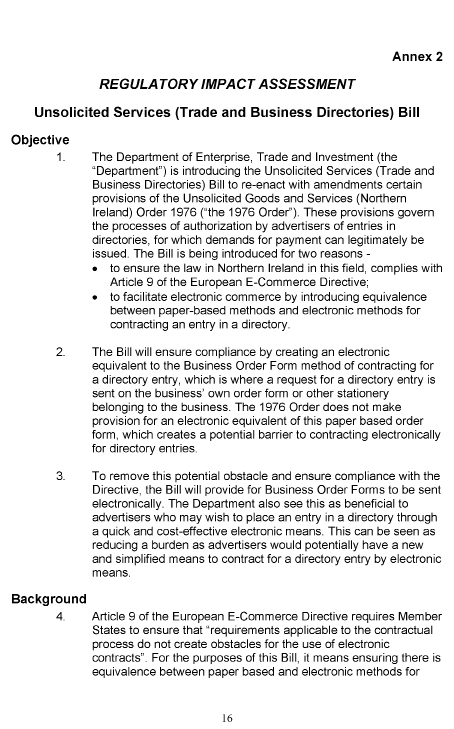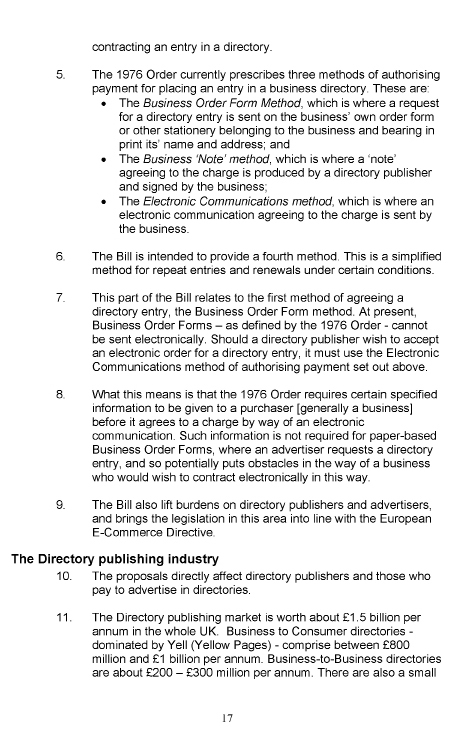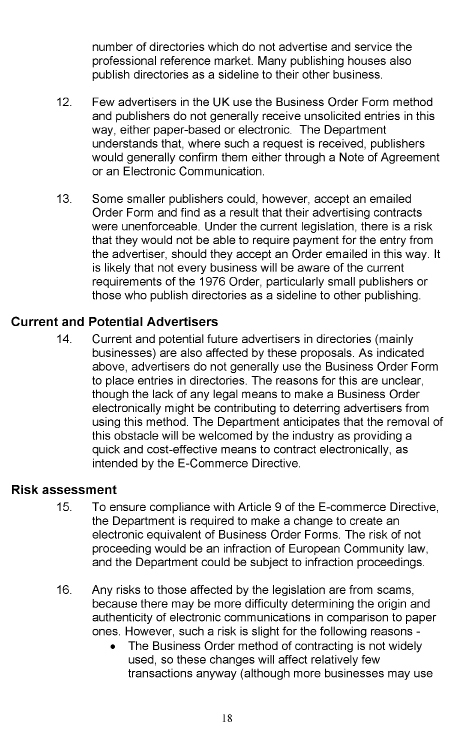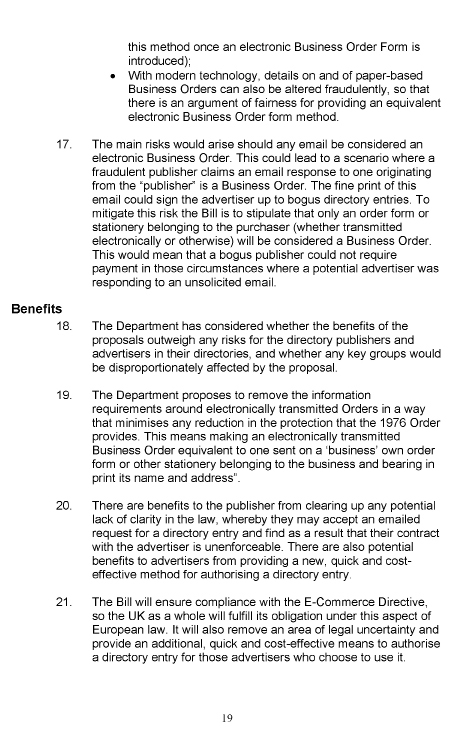Committee for Enterprise, Trade and Investment
Report on Unsolicited Services
(Trade and Business Directories) Bill
Together with the Minutes of Proceedings of the Committee
Relating to the Report and the Minutes of Evidence
Ordered by The Committee for Enterprise, Trade and Investment to be printed 1 July 2010
Report: NIA 74/09/10R Committee for Enterprise, Trade and Investment
Session 2009/2010
Second Report
Membership and Powers
Powers
The Committee for Enterprise, Trade & Investment is a Statutory Committee established in accordance with paragraphs 8 and 9 of the Belfast Agreement, Section 29 of the Northern Ireland Act 1998 and under Assembly Standing Order 46. The Committee has a scrutiny, policy development and consultation role with respect to the Department for Enterprise, Trade & Investment and has a role in the initiation of legislation.
The Committee has power to:
- Consider and advise on Departmental Budgets and Annual Plans in the context of the overall budget allocation;
- Approve relevant secondary legislation and take the Committee stage of relevant primary legislation;
- Call for persons and papers;
- Initiate inquiries and make reports; and
- Consider and advise on matters brought to the Committee by the Minister for Enterprise, Trade & Investment.
Membership
The Committee has 11 members, including a Chairperson and Deputy Chairperson, and a quorum of five members.
The membership of the Committee is as follows:
Mr Alban Maginness (Chairperson) 1
Mr Paul Butler (Deputy Chairperson) 4
Ms Jennifer McCann
Mr Leslie Cree
Mr Daithí McKay 5, 6
Mr David Simpson MP 2
Mr Gregory Campbell MP 3
Mr Paul Frew 7
Dr Alasdair McDonnell MP
Mr Gerry McHugh
Mr Sean Neeson
1 With effect from 30 June 2009 Mr Alban Maginness replaced Mr Mark Durkan.
2 With effect from 14 September 2009 Mr David Simpson replaced Mr Robin Newton.
3 With effect from 14 September 2009 Mr Gregory Campbell replaced Mr Jim Wells.
4 With effect from the 14 September 2009 Paul Butler replaced Jennifer McCann as Deputy Chairperson
5 With effect from the 31 March 2010 Mr Alan McFarland stood down from membership of the committee
6 On 13th April 2010 Mr Daithí McKay was appointed as a Member of the Committee for Enterprise, Trade and Investment.
7 With effect from 28 June 2010 Mr Paul Frew replaced Mr Stephen Moutray.
Table of Contents
Clause by Clause Scrutiny of the Bill
Appendix 1 - Minutes of Proceedings
Appendix 2 - Minutes of Evidence
11 December 2008
Department of Enterprise, Trade and Investment
4 March 2010
Department of Enterprise, Trade and Investment
17 June 2010
Department of Enterprise, Trade and Investment
Appendix 3 – Memoranda and Papers from the Department of Enterprise,
Trade and Investment
3. Letter from the DETI Minister (31 March 2009)
6. Letter from the DETI Minister (8 February 2010)
Appendix 4 – Research Paper
1. Research paper from the Northern Ireland Research and Library Service
Appendix 5
Executive Summary
Purpose
1. The Report details the Committee for Enterprise, Trade & Investment’s consideration of the Unsolicited Services (Trade and Business Directories) Bill.
Principles of the Bill
2. The Committee welcomed the introduction of the Bill and considered the principles of the Bill to be as follows:
- To re-enact, with amendments, certain provisions of the Unsolicited Goods and Services (Northern Ireland) Order 1976 (‘the 1976 Order’). These provisions govern the circumstances in which businesses may be charged for the publication about them in directories.
- To update the legislation to facilitate electronic commerce by introducing equivalence between paper-based methods and electronic methods for contracting an entry in a directory.
3. The Committee engaged in a public consultation exercise and consulted with a wide range of stakeholders with a variety of interests. There were no written responses from either the public consultation or from the stakeholders to which the Committee wrote.
Key Issues
4. There was one key issue that arose during pre-legislative scrutiny of the Bill; however, during evidence sessions with the Department during pre-legislative scrutiny, the Committee’s concern was addressed. During the Committee Stage, one other issue arose relating to contract renewals.
5. The Committee considered that the key issues relating to the Bill were as follows:
- Details required in an invoice; specifically on an electronic invoice
- Notices of renewals on existing contracts
Introduction
6. At the commencement of pre-legislative scrutiny, the Bill was entitled the Unsolicited Goods and Services (Amendment) Bill. On 31 March 2009, the Minister for Enterprise, Trade and Investment wrote to the Committee for Enterprise, Trade & Investment (CETI or the Committee) to state that it has been re-named the Unsolicited Services (Trade and Business Directories) Bill, following advice from the Office of the First Minister and deputy First Minister and the Office of Legislative Council.
7. The Unsolicited Services (Trade and Business Directories) Bill was introduced to the Northern Ireland Assembly on 23 March 2010. The Assembly debated the principles of the Bill in the Second Stage on 20 April 2010, after which it was referred to the Committee for Committee Stage. The Committee sought and received the approval of the Assembly in Plenary Session on 11 May 2010 to extend its consideration and scrutiny of the Bill to 1 October 2010.
8. The Bill contains 9 clauses and 1 schedule.
9. The Committee launched a public consultation on 21 April 2010 and also wrote to key stakeholders for issues relating to the Bill.
10. There were no issues raised from either the key stakeholders or the public consultation.
11. All papers and responses referred to in the report are listed in the appendices.
Summary of the Draft Unsolicited Services (Trade and Business Directories) Bill as Presented to the Committee for Enterprise, Trade & Investment in the Committee Stage
Section One: Control of charges for directory entries
Clause 1 – Control of charges for directory entries
12. Clause 1 provides the prohibition on charges unless one of four conditions (requirements) is met (as prescribed in clauses 2, 3, 4 and 5). The conditions are:
- If an order form is signed;
- If a note of agreement to charge is signed;
- In certain cases of electronic communication; or
- In certain cases of renewed or extended contract.
Section Two: Permitted charges
Clause 2 – Charge permitted if order form signed
13. Clause 2 set the requirements for a charge when an order form has been signed. The requirements are met when an order form has been signed by a person (or on behalf of a person) in hard copy or electronic copy. This must bear the person’s name and address.
Clause 3 – Charge permitted if note of agreement to charge signed
14. Clause 3 sets requirements when a note of agreement is signed by a person (or on behalf of a person).
Clause 4 – Charge permitted in certain cases of electronic communication
15. Clause 4 sets the requirements for a charge in certain cases of electronic communication.
Clause 5 – Charge permitted in certain cases of renewed or extended contract
16. Clause 5 sets the requirements for a charge in certain cases of renewed or extended contract.
Section Three: Offence
Clause 6 – Offence to demand payment where section 1 contravened
17. Clause 6 sets the offence to demand payment when section 1 is breached.
Section Four: Supplementary
Clause 7 – Power to amend the Schedule
18. Clause 7 sets that the Department of Enterprise, Trade and Investment (DETI or the Department) will have power to amend the Schedule to the Bill by Order subject to negative resolution. An Order under that clause may also make any necessary transitional provisions and amendments to provisions referred to in the Schedule.
Clause 8 – Amendment and repeals
19. Clause 8 repeals Articles 5 and 6 of the 1976 Order as they are being replaced by the provisions of the proposed Bill. Article 2(3) of the 1976 Order is being amended because it will need to refer to the conditions in paragraph 4 of the Schedule to the Bill.
Clause 9 – Short title and commencement
20. Clause 9 sets the short title of the Bill as the Unsolicited Services (Trade and Business Directories) Act (Northern Ireland) 2010. Also sets that the Act will come into operation 2 months after the day on which it receives royal assent.
Schedule – Matters referred to in sections 3, 4 and 5
21. The Schedule mirrors the provisions of the Schedule to the Regulatory Reform (Unsolicited Goods and Services Act 1971) (Directory Entries and Demands for Payment) Order 2005 (S.I. 2005/55). The details have, however, been set out in a different sequence to match the sequence in which they occur in the Bill. The Schedule also specifies the matters and details referred to in clauses 3, 4 and 5 of the Bill including:
- Particulars of directory or proposed directory which must be given in a note for charging a person;
- Information required in a written notice;
- Information to be given to a person;
- Conditions applying to invoice or similar document which does not assert right to payment.
Summary of Consideration During Pre-legislative Scrutiny
Details required in an electronic invoice
22. During pre-legislative scrutiny of the Bill, members raised the issue that electronic versions of invoices may be easier to replicate and would potentially lead to more scams targeted towards businesses.
23. The Department responded by stating that any documents that emanate from a directory publisher must have comprehensive details about the charges. The Bill will also be prescriptive about informing business of every aspect of a transaction before an order is placed.
24. Members were content with the Department’s responses.
Summary of Consideration
Clause 5 – Charge permitted in certain cases of renewed or extended contract
25. The Committee sought clarification on whether a business would receive a notice to renew an existing contract from a business directory and if a contract would be automatically renewed unless otherwise informed by the business.
26. The Department responded by stating a business may receive a notice from a business directory to renew the contract, unless otherwise informed by the business.
27. Members were content with the Department’s response.
Clause by Clause Scrutiny of the Bill
Clause 1 – Control of charges for directory entries
Clause 2 – Charge permitted if order form signed
Clause 3 – Charge permitted if note of agreement to charge signed
Clause 4 – Charge permitted in certain cases of electronic communication
Clause 5 – Charge permitted in certain cases of renewed or extended contract
Clause 6 – Offence to demand payment where section 1 contravened
Clause 7 – Power to amend the Schedule
Clause 8 – Amendment and repeals
Clause 9 – Short title and commencement
28. The Committee for Enterprise, Trade and Investment is content with Clauses 1 to 9 as drafted.
Schedule – Matters referred to in section 3, 4 and 5
29. The Committee for Enterprise, Trade and Investment is content with the Schedule as drafted.
Long Title
30. The Committee for Enterprise, Trade and Investment is content with the Long Title as drafted.
Summary of the Draft Unsolicited Services (Trade and Business Directories) Bill as
Presented to the Committee for Enterprise, Trade & Investment in the Committee Stage
Appendix 1
Minutes of Proceedings
Thursday, 11 December 2008
Room 21, Parliament Buildings
Present: Mr Mark Durkan MP (Chairperson)
Mr Leslie Cree
Mr Alan McFarland
Mr Sean Neeson
Mr Robin Newton
Dr Alasdair McDonnell MP
In Attendance: Mr Jim McManus (Assembly Clerk)
Mr Paul Connolly (Assistant Assembly Clerk)
Mr Stephen White (Clerical Supervisor)
Mr Jim Nulty (Clerical Officer)
Apologies: Ms Jennifer McCann (Deputy Chairperson)
Mr Simon Hamilton
Mr Gerry McHugh
10.32 a.m. The meeting opened in public session.
6. Unsolicited Goods Bill
11.30am Officials joined the meeting.
Department Officials John Hinds (Grade 7), Head of Consumer Affairs Branch and Deirdre Dempsey (Staff Officer), Consumer Affairs Branch briefed members on the Unsolicited Goods Bill. Key issues discussed included the rationale behind the proposed Bill and how it would operate in practice.
11.42am Officials left the meeting.
Agreed: The Committee agreed to receive further briefing from officials after the consultation has ended.
[Extract]
Thursday, 1 October 2009
Room 21, Parliament Buildings
Present: Mr Alban Maginness (Chairperson)
Mr Paul Butler (Deputy Chairperson)
Ms Jennifer McCann
Mr Stephen Moutray
Mr Gregory Campbell MP
Mr David Simpson MP
Mr Sean Neeson
Mr Alan McFarland
Dr Alasdair McDonnell MP
Mr Gerry McHugh
In Attendance: Mr Jim McManus (Assembly Clerk)
Ms Sohui Yim (Assistant Assembly Clerk)
Mr Jim Nulty (Clerical Supervisor)
Ms Michelle McDowell (Clerical Officer)
Apologies: Mr Leslie Cree
10.45am The meeting opened in public session
8. Unsolicited Services Bill Report, Outcome of Consultation –Written Briefing.
The Committee noted a written briefing on the Unsolicited Services Bill Report.
[Extract]
Thursday, 18 February 2010
Room 30, Parliament Buildings
Present: Mr Alban Maginness (Chairperson)
Mr Paul Butler (Deputy Chairperson)
Dr Alasdair McDonnell MP
Mr Stephen Moutray
Mr David Simpson MP
Mr Sean Neeson
Mr Gerry McHugh
Mr Leslie Cree
In Attendance: Mr Jim McManus (Assembly Clerk)
Ms Sohui Yim (Assistant Clerk)
Mr Jim Nulty (Clerical Supervisor)
Ms Michelle McDowell (Clerical Officer)
Apologies: Mr Alan McFarland
10.33am The meeting began in public session.
3. Matters arising
The Chair informed members that the Committee has received the Unsolicited Services Bill from the Department.
Agreed: To receive an oral briefing from Departmental officials on the Bill at the meeting of 4 March.
[Extract]
Thursday, 4 March 2010
Room 30, Parliament Buildings
Present: Mr Alban Maginness (Chairperson)
Mr Paul Butler (Deputy Chairperson)
Dr Alasdair McDonnell MP
Mr Alan McFarland
Mr Stephen Moutray
Mr David Simpson MP
Mr Gregory Campbell MP
Mr Sean Neeson
Ms Jennifer McCann
Mr Gerry McHugh
In Attendance: Mr Jim McManus (Assembly Clerk)
Ms Sohui Yim (Assistant Clerk)
Mr Jim Nulty (Clerical Supervisor)
Ms Michelle McDowell (Clerical Officer)
Apologies: Mr Leslie Cree
10.40am The meeting began in public session.
4. Unsolicited Services (Trade and Business Directories) Bill: Oral Briefing
11.12am The Officials joined the meeting.
The Committee received an oral briefing from John Hinds, Head of Consumer Affairs and Philip McClenaghan, Team Leader Legislation Unit. Key issues discussed included the proposed timing for the legislation, current status of the Bill and key aspects of the Bill.
11.27am The Officials left the meeting.
Agreed: To receive a list of full consultees to the Bill.
[Extract]
Thursday, 25 March 2010
Room 30, Parliament Buildings
Present: Mr Alban Maginness (Chairperson)
Mr Paul Butler (Deputy Chairperson)
Mr Alan McFarland
Mr Leslie Cree
Mr Sean Neeson
Mr Gerry McHugh
In Attendance: Mr Jim McManus (Assembly Clerk)
Ms Sohui Yim (Assistant Clerk)
Mr Jim Nulty (Clerical Supervisor)
Ms Michelle McDowell (Clerical Officer)
Apologies: Mr Stephen Moutray
Mr Gregory Campbell MP
Mr David Simpson MP
Dr Alasdair McDonnell MP
Ms Jennifer McCann
10.36am The meeting began in public session.
3. Matters arising
Members noted that the Unsolicited Services (Trade and Business Directories) Bill has been introduced and that the second stage of the Bill is expected shortly after recess.
Agreed: Content with the principles of the Bill.
[Extract]
Thursday, 15 April 2010
Soni Building, Castlereagh House, Belfast
Present: Mr Alban Maginness (Chairperson)
Mr Leslie Cree
Mr Gerry McHugh
Ms Jennifer McCann
Mr Sean Neeson
In Attendance: Mr Jim McManus (Assembly Clerk)
Ms Sohui Yim (Assistant Clerk)
Mr Jim Nulty (Clerical Supervisor)
Ms Michelle McDowell (Clerical Officer)
Apologies: Mr Paul Butler (Deputy Chairperson)
Mr David Simpson MP
Mr Gregory Campbell MP
Mr Stephen Moutray
Mr Daithí McKay
Dr Alasdair McDonnell MP
11.50am The meeting began in public session.
3. Matters arising
Members discussed a Departmental briefing on the summary of responses to the consultation on the Unsolicited Services Bill, a list of key stakeholders for the Bill and the draft public notice for the Bill.
Agreed: To write to the list of stakeholders for the Bill.
Agreed: Content with the public notice and the closing date for submissions.
[Extract]
Thursday, 22 April 2010
Room 30, Parliament Buildings
Present: Mr Alban Maginness (Chairperson)
Mr Paul Butler (Deputy Chairperson)
Ms Jennifer McCann
Mr Daithí McKay
Dr Alasdair McDonnell MP
Mr Leslie Cree
Mr Gerry McHugh
In Attendance: Mr Jim McManus (Assembly Clerk)
Ms Sohui Yim (Assistant Clerk)
Mr Jim Nulty (Clerical Supervisor)
Ms Michelle McDowell (Clerical Officer)
Apologies: Mr Stephen Moutray
Mr Gregory Campbell MP
Mr David Simpson MP
Mr Sean Neeson
10.35am The meeting began in public session.
3. Matters Arising
Members noted a draft motion to extend the Committee stage of the Unsolicited Services Bill.
Agreed: Content with the extension.
[Extract]
Thursday, 13 May 2010
Room 30, Parliament Buildings
Present: Mr Alban Maginness (Chairperson)
Mr Paul Butler (Deputy Chairperson)
Ms Jennifer McCann
Mr Stephen Moutray
Mr Gregory Campbell MP
Mr David Simpson MP
Dr Alasdair McDonnell MP
Mr Sean Neeson
Mr Leslie Cree
Mr Gerry McHugh
In Attendance: Mr Jim McManus (Assembly Clerk)
Ms Sohui Yim (Assistant Clerk)
Mr Jim Nulty (Clerical Supervisor)
Ms Michelle McDowell (Clerical Officer)
Apologies: Mr Daithí McKay
10. Unsolicited Services (Trade and Business Directories) Bill – Assembly Research Paper – Written Briefing
Members noted the written briefing.
Agreed: To consider the research paper provided when the Committee further considers the Bill.
[Extract]
Thursday, 10 June 2010
Room 30, Parliament Buildings
Present: Mr Alban Maginness (Chairperson)
Mr Paul Butler (Deputy Chairperson)
Dr Alasdair McDonnell MP
Mr Gregory Campbell MP
Mr Stephen Moutray
Mr Leslie Cree
Mr Sean Neeson
Mr Gerry McHugh
In Attendance: Mr Jim McManus (Assembly Clerk)
Ms Sohui Yim (Assistant Clerk)
Mr Jim Nulty (Clerical Supervisor)
Ms Michelle McDowell (Clerical Officer)
Apologies: Ms Jennifer McCann
10.33am The meeting began in closed session.
1. Consideration of the Unsolicited Services (Trade and Business Directories) Bill: Internal Memorandum from the Examiner of Statutory Rules
Members discussed the Examiner’s memorandum.
Agreed: Content with the Examiner’s advice.
Agreed: Content to take no oral evidence for the Bill and to commence the preliminary view of the Bill and, if no issues are raise, the clause-by-clause scrutiny of the Bill at next week’s meeting.
[Extract]
Thursday, 17 June 2010
Room 30, Parliament Buildings
Present: Mr Alban Maginness (Chairperson)
Mr Paul Butler (Deputy Chairperson)
Mr Daithí McKay
Dr Alasdair McDonnell MP
Mr Gregory Campbell MP
Mr Stephen Moutray
Mr Leslie Cree
Mr Sean Neeson
In Attendance: Mr Jim McManus (Assembly Clerk)
Ms Sohui Yim (Assistant Clerk)
Mr Jim Nulty (Clerical Supervisor)
Ms Michelle McDowell (Clerical Officer)
Apologies: Ms Jennifer McCann
6. Consideration of the Unsolicited Services (Trade and Business Directories) Bill: Written Briefing.
Members discussed the written briefing. There were no issues raised in relation to the Bill.
12.09pm Officials from the Department joined the meeting to answer member’s questions – Philip McClenaghan and Patrick Neill.
Agreed: Content with the Bill, as drafted, and to proceed to formal clause-by-clause scrutiny of the Bill.
12.12pm Gregory Campbell left the meeting.
7. Formal Clause-by-Clause Scrutiny of the Unsolicited Services (Trade and Business Directories) Bill
The Committee formally scrutinised, clause-by-clause, The Unsolicited Services (Trade and Business Directories) Bill and agreed the following:
Clause 1 – Control of Charges for directory entries
Question put and agreed: That the Committee is content with Clause 1, as drafted.
Clause 2 – Charge permitted if order form signed
Question put and agreed: That the Committee is content with Clause 2, as drafted.
Clause 3 – Charge permitted if note of agreement to charge signed.
Question put and agreed: That the Committee is content with Clause 3, as drafted.
Clause 4 – Charge permitted in certain cases of electronic communication
Question put and agreed: That the Committee is content with Clause 4, as drafted.
Clause 5 – Charge permitted in certain cases of renewed or extended contract
Question put and agreed: That the Committee is content with Clause 5, as drafted.
Clause 6 – Offence to demand payment where section 1 contravened
Question put and agreed: That the Committee is content with Clause 6, as drafted.
Clause 7 – Power to amend the schedule
Question put and agreed: That the Committee is content with Clause 7, as drafted.
Clause 8 – Amendment and repeals
Question put and agreed: That the Committee is content with Clause 8, as drafted.
Clause 9 – Short title and commencement
Question put and agreed: That the Committee is content with Clause 9, as drafted.
Schedule
Question put and agreed: That the Committee is content with the schedule, as drafted.
Long Title
Question put and agreed: That the Committee is content with the long title, as drafted.
Agreed: To consider a first draft of the report next week.
12.13am Alasdair McDonnell rejoined the meeting.
[Extract]
Thursday, 24 June 2010
Room 30, Parliament Buildings
Present: Mr Alban Maginness (Chairperson)
Mr Paul Butler (Deputy Chairperson)
Ms Jennifer McCann
Dr Alasdair McDonnell MP
Mr Gregory Campbell MP
Mr Gerry McHugh
Mr Leslie Cree
Mr Sean Neeson
In Attendance: Mr Jim McManus (Assembly Clerk)
Ms Sohui Yim (Assistant Clerk)
Mr Jim Nulty (Clerical Supervisor)
Ms Michelle McDowell (Clerical Officer)
Apologies: Mr David Simpson MP
Mr Stephen Moutray
10.03am The meeting began in public session.
11. Consideration of Unsolicited Services (Trade and Business Directories) Bill Final Draft of Report: - Written Briefing.
Members discussed the draft report of the Bill.
Agreed: That the executive summary at paragraphs 1-5 stands part of the report.
Agreed: That the introduction at paragraphs 6-11 stands part of the report.
Agreed: That the summary of the draft Unsolicited Services (Trade and Business Directories) Bill as presented to the Committee at paragraphs 12-21 stands part of the report.
Agreed: That the summary of consideration during pre-legislative scrutiny at paragraphs 22-24 stands part of the report.
Agreed: That the summary of consideration at paragraphs 25-27 stands part of the report.
Agreed: That the clause-by-clause consideration of the Bill at paragraphs 28-30 stands part of the report.
[Extract]
Thursday, 1 July 2010
Room 144, Parliament Buildings
Present: Mr Alban Maginness (Chairperson)
Mr Gregory Campbell MP
Mr Paul Frew
Mr Sean Neeson
Mr Gerry McHugh
In Attendance: Mr Jim McManus (Assembly Clerk)
Mr Jim Nulty (Clerical Supervisor)
Ms Michelle McDowell (Clerical Officer)
Ms Alison Ferguson (Clerical Officer)
Apologies: Mr Paul Butler (Deputy Chairperson)
Ms Jennifer McCann
Mr Leslie Cree
7. Consideration of Unsolicited Services (Trade and Business Directories) Bill – Final Draft of Report: Written briefing
The Committee formally scrutinised each appendix of the final Bill report.
Agreed: That the following papers should be appended to the Committee’s report:
Minutes of proceedings
Minutes of evidence (Hansards)
Memoranda and papers from DETI
The Assembly Research Paper
List of witnesses
Agreed: Chair to approve an extract from today’s minutes which reflect the read-through of the Report.
Agreed: To lay the report in its entirety in the Assembly Business Office after today’s meeting.
Agreed: To order 30 reports with a CD ROM and 10 full reports for printing.
[Extract]
Appendix 2
Minutes of Evidence
11 December 2008
Members present for all or part of the proceedings:
Mr Mark Durkan (Chairperson)
Mr Paul Butler
Mr Leslie Cree
Mr Alan McFarland
Mr Sean Neeson
Mr Robin Newton
Mr Jim Wells
Witnesses:
Ms Deirdre Dempsey |
Department of Enterprise, Trade and Investment |
1. The Chairperson (Mr Durkan): I welcome John Hinds, head of the consumer affairs branch of the Department of Enterprise, Trade and Investment (DETI), and Deirdre Dempsey, who is also from that branch, to this morning’s Committee meeting. They will give a briefing on the proposed unsolicited goods Bill. The Committee may wish to receive further briefing at the end of the consultation process. I remind members and visitors that this part of today’s proceedings is being reported by Hansard.
2. Mr John Hinds (Department of Enterprise, Trade and Investment): Thank you for giving us the opportunity to speak to the Committee about the proposed Bill. The Committee received advance notice of our intentions on 13 May 2008. The overall intention of the proposed Bill is to bring Northern Ireland law into line with that in GB and to ensure compliance with article 9(1) of what is known as the e-commerce directive of the European Community.
3. The proposed Bill will make technical amendments to the provisions that control the circumstances in which businesses may be charged for the publication of entries about them in trade directories. It will allow an advertiser to place an entry in a business directory by sending the publisher an order form — or other business stationery — by electronic means. The proposed Bill will be drafted so as to ensure that safeguards for businesses will continue to be in place to act against scams that are practised in relation to the publication of real or pretended directory products.
4. The proposed Bill is intended to remove provisions that the Department believes are burdensome and unnecessary for businesses, to remove anomalies, and to ensure the compatibility of Northern Ireland law with the obligations that arise from membership of the European Union. It is intended that the proposed Bill will improve efficiency for businesses by relaxing and simplifying the arrangements for: first, repeats and renewals of directory entries; secondly, sending order forms electronically; and thirdly, the requirements that cover the form and content of invoices and other documents.
5. In summary, the Department believes that the proposed Bill will strike the right balance by removing obstacles to contracting by electronic means, ensuring compliance with the e-commerce directive and ensuring, as far as possible, that advertisers and trade directories are protected from scams. After the Committee has had the opportunity to comment on the proposed Bill, the Department intends to submit a draft policy consultation document to the Executive in February 2009 and to consult between February and April 2009.
6. We have spoken already to the Data Publishers Association, which supports our proposals. As part of the consultation, we will, of course, speak to the Federation of Small Businesses, the Confederation of British Industry (CBI) and the Institute of Directors (IOD) in order to alert businesses about the enhanced level of protection that the Bill will provide. Instructions will then be sent to the legislative draftsman, and we hope to have Executive clearance for the proposed Bill by November 2009. The Department’s proposals are set out in more detail in the draft consultation document that was sent to the Committee. I am happy to answer any questions that the Committee may have.
7. The Chairperson: How did the issue arise? Why has the introduction of the proposed Bill become a priority for the Department?
8. Mr Hinds: The proposed Bill is essentially a piece of parity legislation. GB colleagues legislated in 2005 to bring the law up to speed in the area. At that time, the Department did not attach a high priority to the matter, and we did not introduce proposals for legislation. However, with the passage of time, we felt that the anomaly needed to be addressed, and we feel that now is a good time to do so, particularly given the need to comply with the e-commerce directive.
9. The Chairperson: Was anyone pushing the Department on the matter? Did anyone say that the anomaly was affecting them, or was that anomaly simply something about which the Department was conscious?
10. Mr Hinds: Apart from advice from our lawyers and solicitors to the effect that we would be in contravention of the directive if we did not introduce the legislation, no other pressure has been brought to bear by outside influences.
11. Mr Wells: The banes of my life are emails offering to improve various parts of my anatomy, which I am not interested in, and —
12. Mr Cree: It is too late, Jim.
13. The Chairperson: You have given up on them.
14. Mr Wells: Another bane of my life is emails that come from the widow of some African dictator who has $10 million to invest in Europe. Those emails tell me that if I allow her to have my bank account number, I can have 10% of that money. I do not believe that too many of those are bona fide emails. Similarly, I receive a constant stream of letters and emails to say that I owe £50 to have my name inserted in some business directory in Barcelona or wherever. I have enough trouble dealing with all the people with whom I must deal at the moment, never mind including my name in a business directory.
15. Perhaps I picked you up wrongly, but I thought that you said that one would be able to order and confirm placements by email. I would have thought that that would have made life easier for the scammers.
16. Mr Hinds: The legislation will specify arrangements to make the business in complete control of what it authorises. For example, the order form that is transmitted electronically must be filled out on business stationery or on other material that emanates directly from the business. Thus, the legislation will prescribe that the business must authorise the content and the detail of the form before it can be entered in the trade directory.
17. Mr Wells: Surely somebody in a hothouse in Barcelona, the Dominican Republic or the Cayman Islands — places from where such emails tend to come — could be clever about their scams. Given that many companies advertise, it would be easy to prepare a pro forma of a mock order form after copying the logo on the stationery and then to send that by email. Someone would sign up to the arrangement by hitting the “confirm" button, and a secretary sitting in a busy office might think that the scam is authentic.
18. Every day, I receive authentic-looking correspondence that is supposedly from the Abbey National or the Halifax. However, that correspondence is a scam; the scammers are trying to get me to feed back my account details so that they can take money from my account. Surely if such scams can be carried out electronically, a completely new industry opens up for the scam merchants.
19. Mr Hinds: Other provisions in the proposed Bill will insist that any documents that emanate from the directory publisher must have comprehensive details about the charges. The publisher will have to specify whether any demands will be placed on the business regarding the price of the directory and when and how many directories will be published. Therefore, the proposed Bill will be quite prescriptive about informing businesses of every aspect of the transaction before an order is placed.
20. Mr Wells: I am sure that the folks working in the boiler rooms will include all that. However, I am slightly worried about a hard-pressed secretary in a front office somewhere who receives correspondence that looks authentic, and, by simply pushing a button, she produces a liability. Email is now the most popular method of scamming.
21. Mr Hinds: The onus is on the directory publisher to prove that the order in the stipulated design was legitimate and that it emanated from the business. The business can take some control over that. Therefore, the directory publisher cannot receive a fake authorisation willy-nilly in the way that you described, because they would be subject to prosecution.
22. Mr Wells: Yes, but if the scammer is in the Cayman Islands, the invoice could be paid electronically before the scan is discovered. In my email in-box today, I will have received at least 40 scam emails from various sources, some of which appear to be incredibly authentic. Every day in life I delete such emails. The only reason that I know that some of the emails are scams is because I do not have accounts with the banks that allegedly want me to confirm my account details. For instance, the Bank of America wrote to ask me to confirm my account details, but I do not have an account with that bank. However, it would be a different matter if I were to receive an email that came supposedly from the Ulster Bank using the same wonderfully prepared and extremely accurate documents.
23. There is a huge postal scamming industry, so it must be made particularly difficult for people to be scammed by email. However, people regard emails as junk currency. Some £11 million a year is defrauded from people in Britain from Nigerian scams alone. There is a name for the particular scam, but I do not recall it. We must be worldly-wise so far as these characters are concerned, because they are so good at what they do.
24. Mr Hinds: The Department will advise companies about the protection that the proposed Bill will provide. We have warned them, and we will continue to alert them to specific scams that target businesses. We have not had any complaints, and no companies have told us that they have been the victims of the type of scam that you mentioned. However, we intend to liaise with business organisations to ensure that their members are aware of what the provisions in the proposed Bill will allow for and of what they should be alert to.
25. Mr Wells: I think that signing up should be doable by email. However, there should be no liability, and nothing should be forcibly paid until something is followed up by a hard copy.
26. The Chairperson: I think that that point has been well made now.
27. Mr Cree: I have tried to get excited by this issue, but I have been unsuccessful. Is it fair to say that the proposed Bill will make our legislation compliant with that in the UK and Europe and that it will afford the same protections and benefits that exist in the rest of the UK? Is it as simple as that?
28. Mr Hinds: Yes.
29. Mr Cree: I am happy enough, then.
30. The Chairperson: The proposed Bill will make a difference to a local business directory. If a firm compiles a UK-wide sectoral business directory, on what basis does it deal with Northern Ireland firms? Does that happen under existing GB law or under existing Northern Ireland law?
31. Mr Hinds: The UK trade directory publishers are caught by GB legislation, but Northern Ireland trade directory publishers are not. Therefore, any transactions between Northern Ireland businesses and Northern Ireland-based trade directory publishers will be caught by the Bill.
32. The Chairperson: Does that mean that they will be in the same position? At present, do firms that deal with directory propositions that come from somewhere such as Birmingham have to comply with laws that are different to those that cover propositions that come from somewhere else?
33. Mr Hinds: That is exactly right.
34. Mr Newton: My point is a small one. The Bill will offer no protection for the individual; it is orientated more towards businesses.
35. Mr Hinds: That is correct.
36. Mr Newton: Therefore, Jim’s point is valid. The proposed Bill will not cover the majority of the scam emails such as those that he receives.
37. Mr Hinds: The proposed legislation will not cover such situations. However, The Consumer Protection from Unfair Trading Regulations 2008 updated the law on several unfair practices, including scams that affect individual consumers. Therefore, comprehensive protection has been introduced already. That was done on foot of the introduction of the Unfair Commercial Practices Directive, which was European led.
38. The Chairperson: The Committee will want to pick up on the feedback from the consultation. You said that you will be talking to members of the Federation of Small Businesses. I assume that they will refer to their colleagues across the water about those elements of the legislation have or have not worked and about what positive or negative differences have been made. There may come a time, Leslie, when the proposed Bill generates some excitement. That will depend on the feedback that emerges from the consultation. For now, members have nothing further to add.
39. Thank you for attending today’s meeting.
4 March 2010
Members present for all or part of the proceedings:
Mr Alban Maginness (Chairperson)
Mr Paul Butler (Deputy Chairperson)
Mr Gregory Campbell
Ms Jennifer McCann
Dr Alasdair McDonnell
Mr Alan McFarland
Mr Gerry McHugh
Mr Stephen Moutray
Mr Sean Neeson
Mr David Simpson
Witnesses:
Mr John Hinds |
Department of Enterprise Trade and Investment |
40. The Chairperson: I welcome John Hinds, who is head of consumer affairs, and Phillip McClenaghan, who is team leader of the legislation unit. I am very pleased to see you this morning. I am sorry for keeping you waiting, but we had some other business to attend to. We are very pleased that you have come along to brief us on the proposed unsolicited services (trade and business directories) Bill.
41. Mr Hinds (Department of Enterprise, Trade and Investment): Good morning. Thank you for affording us the opportunity to update you on our earlier briefings on the proposed unsolicited services (trade and business directories) Bill.
42. I am head of consumer affairs, and my colleague Phillip McClenaghan is from our legislation unit. As the Committee will be aware, the Department has kept it fully informed of progress since the Department’s original proposals emerged in May 2008. The most recent letter from the Minister issued to the Committee on 8 February. At its meeting on 25 February, the Executive agreed that the Bill should be introduced in the Assembly, and we plan to do so around 22 March. The Secretary of State has given his consent to the consideration of the Bill by the Assembly, and we received that on 24 February.
43. Essentially, the Bill will bring Northern Ireland law into line with that in GB and ensure compliance with article 9(1) of the European Community’s e-commerce directive. The Bill is a technical, non-controversial measure. It will re-enact, with technical amendments, certain provisions of the Unsolicited Goods and Services (Northern Ireland) Order 1976. Those provisions control the circumstances in which businesses may be charged for the publication of entries about them in directories. As I agreed with the Committee in December 2008, the Department took steps to specifically offer additional briefing to the Northern Ireland Chamber of Commerce, the Northern Ireland branches of the Institute of Directors, the Federation of Small Businesses and the Confederation of British Industries during the consultation process. None of those organisations had any concerns with the proposals and welcomed the Bill.
44. The Bill is intended to enable businesses to improve efficiency by relaxing and simplifying arrangements for repeats and renewals of directory entries, arrangements for sending order forms electronically and requirements covering the form and content of invoices and other documents. The Bill will update the law to reflect the modern and commercial realities of the directory publishing industry, while ensuring that the legislation continues to provide protection for businesses against a number of scams. I welcome any questions that Committee members might have.
45. The Chairperson: Thank you for your presentation. This is fairly straightforward legislation. Am I right in saying that it arises out of the fact that electronic communications have moved on and that it is an attempt to catch up with the pace of change?
46. Mr Hinds: That is right. It also reflects the fact that corresponding legislation was enacted in 2005 in GB. We have been meaning to bring the Bill forward. It has not been a high priority, given the small nature of the business directory sector in Northern Ireland, but it is has been on the stocks. It will bring the law in Northern Ireland up to date, and it will fulfil our European obligations.
47. The Chairperson: It is at one with the European directive.
48. Mr Hinds: Yes.
49. The Chairperson: Have there been any complaints about the problem that the Bill seeks to address?
50. Mr Hinds: Last month, our colleagues in the Trading Standards Service, in conjunction with the PSNI, issued a press release about Yell’s trade directory publication. In that instance, businesses and individuals were being targeted by fraudulent invoices. That, therefore, brings to the public notice the fact that scams continue to affect businesses and consumers in Northern Ireland. The protection that the Bill affords will help in some way to curtail those activities and continue to protect businesses against those types of scams.
51. The Chairperson: The company or the person who is charging has to give particulars in relation to the amount that will be charged. It has to give written notice, which provides the name of the directory or the proposed directory; the name of the person or firm producing the directory; the address; and the price at which the directory is offered for sale.
52. Mr Hinds: That is correct.
53. The Chairperson: Those rules must be complied with in order to administer a charge. Is that correct?
54. Mr Hinds: That is correct. It helps to ensure that the whole process is transparent and that the business knows what it is getting up front. If those rules are not complied with, businesses will know to be suspicious of any attempts to elicit money from them.
55. The Chairperson: The idea is to locate the firm or individual, so that it is not something out in the ether. It is important to pin down the firm or individual who is responsible for the proposed directory.
56. Mr Hinds: That is correct.
57. Mr Moutray: I am not sure whether I heard all the points. Very few copies of some directories are, in fact, distributed. Can that be tightened?
58. Mr Hinds: The Bill will force any organisation that is trying to promote a directory to include information on the number of copies of the directory that will be published and details on how they will be distributed. That will be covered by the Bill.
59. The Chairperson: That allows the purchaser to know how valuable the directory is and how widespread its distribution will be.
60. Mr Hinds: That is correct.
61. Mr Butler: How widespread are the scams? In February, the Office of Fair Trading had its scam awareness month. Some of the figures in Britain are alarming. How bad is it here?
62. Mr Hinds: Scams represent quite a range of activity. The Bill relates only to trade directories. In the wider picture, scams affect a number of businesses and consumers. Our colleagues in the Trading Standards Service have a raft of legislation that allows them to pursue individuals involved in scams.
63. We use the media proactively to warn consumers and businesses about specific scams. I mentioned the Yell directory scam. We try to discover which countries those scams come from so that businesses can be wary of communications that emanate, for example, from Holland or some other source. We work closely with the PSNI’s organised crime branch to ensure that businesses know the particulars of such scams.
64. Mr McHugh: I can see the benefits of the Bill. By how much will it reduce scams and unsolicited emails? The Government’s computerised systems are protected, but many businesses could employ someone full-time to wipe out the rubbish that appears on computer screens. People have to make enormous efforts to beat back all that rubbish, some of which is very dangerous. People at home can get threatening letters and all sorts.
65. Mr Hinds: The Bill is directed at businesses, not consumers. It is designed to afford some protection to the business community. In that regard, we recognise that it may be difficult, particularly for small businesses, to be alert to scams and fraudulent claims. We acknowledge that, as part of the Bill’s implementation process, we will have to focus on informing and educating the business representative bodies to ensure that owners of small businesses and their employees know what to look out for.
66. Mr Campbell: I notice that a number of organisations had no comments to make. I presume that that is because they are content. There does not seem to be anything untoward or controversial in the Bill. Have there been any responses from businesses saying that the Bill is fine, but that they have proposals to make about dealing with untoward contact or unsolicited services? Have any businesses made representations of that sort?
67. Mr Hinds: No. We discussed this proposed Bill with the Committee back in December 2008. We took specific steps to talk to the business representative bodies. As well as the general consultation letter that is normally sent to a wide range of interested parties for any proposed legislation, we crafted slightly different letters to send to the business representative bodies on the foot of the interest expressed by the Committee and the likely effect that the Bill would have. We followed up that letter with telephone calls and offered additional briefings, so that businesses would be well aware of the Bill and its consequences. However, they all felt comfortable with the Bill’s proposals and the protections that would afford them. The exception was the Federation of Small Businesses, which wrote to say that it welcomed the Bill and had no other issues to discuss with us.
68. Mr Campbell: I am happy enough with that answer, but I have had contact with a number of people who have told me about the nature of the scams to which they have fallen victim. I concur fully with what they said: they are not content just to delete the emails or resist the scam. They want private business to come up with something that could target the scammers. Rather than just avoid being caught out, they want to devise a system that would not only ensure that the scammers did not make a profit but would cost them money.
69. Obviously, that has nothing to do with the Bill, but I just wondered whether private businesses had ever made any representations along those lines, beyond simply trying to protect people by making it more difficult for scammers to operate in the future? Is there some way of ensuring that scams cost the scammers money rather than make them a profit?
70. Mr Hinds: I am not aware of any such suggestions from the business community. Our colleagues in the Trading Standards Service work very closely with the business community in enforcing a wide range of consumer protection legislation. In that sense, there is a good working relationship and, as I said before, we are proactive in trying to warn people about specific scams. We describe what they will look like and the sort of contact that the business might receive from a prospective scammer. As Mr Butler mentioned, during scams awareness week we engaged in a wide range of activity to make the issue of scams as high profile and as visible as possible.
71. The Chairperson: Thank you. It would be helpful if the Committee were to receive a full list of the consultees.
72. Mr Hinds: Certainly.
73. The Chairperson: Then we will proceed to deal with the legislation in the normal fashion. Thank you very much for coming along. It has been very helpful.
17 June 2010
Members present for all or part of the proceedings:
Mr Alban Maginness (Chairperson)
Mr Paul Butler (Deputy Chairperson)
Mr Gregory Campbell
Mr Leslie Cree
Dr Alasdair McDonnell
Mr Stephen Moutray
Mr Sean Neeson
Witnesses:
Mr Philip McClenaghan |
Department of Enterprise, Trade and Investment |
74. The Chairperson (Mr A Maginness): We now move to the initial consideration of the Unsolicited Services (Trade and Business Directories) Bill. This is the Committee’s opportunity to raise any issues, concerns or matters that have arisen from the consultation process. I advise members that departmental officials are on standby to address any questions or concerns. This agenda item does not constitute the formal clause-by-clause scrutiny of the Bill. However, if there are no unresolved issues or concerns following this agenda item, the Committee will move immediately to formal clause-by-clause scrutiny.
75. I advise members that the issues tables in their packs explain each clause of the Bill. No issues were raised during the Department’s or the Committee’s consultations on the Bill. The three responses to the Department’s consultation stated that they welcomed the Bill. The Clerk will take the Committee through the clauses, and, after he has outlined the provisions of each clause, I will ask members whether they have any issues or questions for the departmental officials.
76. The Committee Clerk: Clause 1 sets the prohibition on charges unless one of four conditions or requirements is met, as prescribed in clauses 2 to 5. Those conditions are: if an order form is signed; if a note of agreement to charge is signed; in certain cases of electronic communication; or in certain cases of renewed or extended contract.
77. No issues or concerns were raised in respect of clause 1 during the Department’s or the Committee’s consultation.
78. The Chairperson: Are members content?
Members indicated assent.
79. The Committee Clerk: Clause 2 sets the requirements for a charge when an order form has been signed. Requirements are met when an order form has been signed by, or on behalf of, a person in hard or electronic copy, which must bear the person’s name and address.
80. No issues or concerns were raised during either the Department’s or the Committee’s consultation.
81. The Chairperson: Are members content?
Members indicated assent.
82. The Committee Clerk: Clause 3 sets the requirements when a note of agreement to charge is signed. The requirements are met when the note: specifies the particulars as set in paragraph 1 of the schedule to the Bill; gives reasonable particulars of the entry in respect of which the charge would be payable; and when a copy of the note was given to the person, or a person acting on his or her behalf, before it was signed.
83. No issues or concerns were raised in respect of clause 3 during the Department’s or the Committee’s consultation.
84. The Chairperson: Are members content?
Members indicated assent.
85. The Committee Clerk: Clause 4 sets the requirement for a charge permitted in certain cases of electronic communication. The requirements are met if: there has been an electronic communication from or on behalf of the person that states that they agree to the charge; and, before the electronic communication was sent, the following information was transmitted to the person:
“(i) the particulars set out in paragraph 1 of the Schedule; and
(ii) reasonable particulars of the entry in respect of which the charge would be payable".
86. Additionally, the electronic communication has to be readily produced and retained in a visible and legible form.
87. No issues of concern were raised in respect of clause 4 during either the Department’s consultation or the Committee’s consultation.
88. The Chairperson: Are members content?
Members indicated assent.
89. The Committee Clerk: Clause 5 sets the requirement for charges permitted in certain cases of renewed or extended contract. No issues or concerns were raised relating to clause 5 during either the Department’s consultation or the Committee’s consultation.
90. Mr Cree: Does the clause cover a situation in which an insurance company would notify its customers that renewal of contract will happen automatically and that customers will, therefore, be debited accordingly without any further communication? Does it put the onus back on to the customer?
91. The Chairperson: It would perhaps be helpful at this stage if Mr McClenaghan and Mr Neill came forward and joined us at the table.
92. Mr Philip McClenaghan (Department of Enterprise, Trade and Investment): The legislation is aimed only at trade directories. Therefore, it would not apply to insurance contracts or their renewals.
93. Mr Cree: It may or may not link to those, howsoever they are arrived at. Continuing on, we could have a situation in which there would be automatic renewal.
94. Mr McClenaghan: For insurance contracts?
95. Mr Cree: That is just one example. It could be any contract.
96. Mr McClenaghan: The legislation is aimed at, for example, a tradesperson with an advert in the ‘Yellow Pages’, or a similar trade directory, who wishes to renew that advert on an annual basis.
97. Mr Cree: The same would apply to insurance. A customer may receive a communication to say that their contract will be renewed unless the company hears otherwise.
98. Mr McClenaghan: Yes.
99. The Chairperson: Are members content?
Members indicated assent.
100. The Committee Clerk: Clause 6 sets the offence to demand payment when clause 1 is contravened. No issues or concerns were raised in respect of clause 6 during either the Department’s consultation or the Committee’s consultation.
101. The Chairperson: Are members content?
Members indicated assent.
102. The Committee Clerk: Clause 7 sets the power to amend the schedule. The Department of Enterprise, Trade and Investment will have the power to amend the schedule to the Bill by Order, subject to negative resolution. An Order made under clause 7 may also make any necessary transitional provisions and amendments to revisions that are referred to in the schedule.
103. No issues or concerns were raised relating to clause 7 during either the Department’s consultation or the Committee’s consultation. Furthermore, the Examiner of Statutory Rules gave advice on the powers to make subordinate legislation under the clause — which was considered by members on 10 June — and stated that the powers seemed appropriate.
104. The Chairperson: Are members content?
Members indicated assent.
105. The Committee Clerk: Clause 8 repeals articles 5 and 6 of the Unsolicited Goods and Services (Northern Ireland) Order 1976 because they are being replaced by the provisions of the proposed Bill. Article 2(3) of the 1976 Order is being amended because it will need to refer to the conditions set out in paragraph 4 of the schedule to the Bill.
106. No issues or concerns were raised in respect of clause 8 during either the Department’s consultation or the Committee’s consultation.
107. The Chairperson: Are members content?
Members indicated assent.
108. The Committee Clerk: Clause 9 sets the short title as the Unsolicited Services (Trade and Business Directories) Act (Northern Ireland) 2010. The clause also sets out that the Act will come into operation two months after the day on which it receives Royal Assent.
109. No issues or concerns were raised in respect of clause 9 during either the Department’s consultation or the Committee’s consultation.
110. The Chairperson: Are members content?
Members indicated assent.
111. The Committee Clerk: The schedule specifies the matters and details referred to in clauses 3, 4 and 5 of the Bill, including: particulars of the directory or proposed directory, which must be given in a note for charging a person; information required in a written notice; information to be given to a person; and conditions applying to an invoice or similar document that does not assert right to payment.
112. No issues or concerns relating to the schedule were raised during the Department’s consultation or the Committee’s consultation.
113. The Chairperson: Are members content with their initial consideration of the Bill?
Members indicated assent.
114. The Chairperson: No issues having arisen, we will now move directly to the formal clause-by-clause scrutiny of the Unsolicited Services (Trade and Business Directories) Bill. I will go through the nine clauses and the schedule to seek the Committee’s position. I remind members that, having given their views on each clause as drafted, no amendments have been made to date by the Department or by the Committee.
Clauses 1 to 9 agreed to.
Schedule agreed to.
Long title agreed to.
115. The Chairperson: That concludes the formal clause-by-clause scrutiny of the Unsolicited Services (Trade and Business Directories) Bill. Next week, members will consider the first draft of the Committee’s report on the Bill. Thank you.
Appendix 3
Memoranda and Papers
from DETI
Letter to Committee May 08
176 Newtownbreda Road
BELFAST
BT8 6QS
Tel: (028) 9025 3902
Fax: (028) 9025 3953
Text Phone: (028) 9025 3988
E-mail: john.hindsl@detini.gov.uk
Ms Lucia Wilson
Clerk Enterprise, Trade and Investment Committee
Room 424
Parliament Buildings
Stormont
BELFAST
BT4 3XX
13 May 2008
Proposed Unsolicited Goods and Services (Amendment) Bill
I am writing to inform the Committee that the Department of Enterprise, Trade and Investment is proposing to seek Executive approval to introduce a Bill, in the 2009/10 Assembly Session, to amend the Unsolicited Goods and Services (Northern Ireland) Order 1976 (“the 1976 Order"). The 1976 Order is available on line here –
http://www.statutelaw.gov.uk/legResults.aspx?LegType=All_Primary&PageNumber=1&BrowseLetter=U&NavFrom=1&activeTextDocId=1910173
The Committee will be consulted on the detailed proposals for the Bill prior to the public consultation, which is likely in the autumn. Nevertheless, the Department wished to inform the Committee of the proposed Bill (which is technical in nature and non controversial) at an early stage.
The Unsolicited Goods and Services (Northern Ireland) Order 1976 was passed, amongst other reasons, to control the circumstances in which businesses could be charged for the publication of entries about them in directories. It had been the case prior to the 1976 Order that unwary businesses could be tricked by various sharp practices into paying for directory entries for which they had not asked and which they did not want.
The proposed Bill will amend the provisions of the 1976 Order governing the processes of authorization by advertisers of entries in directories for which demands for payment can legitimately be issued. It will be similar in effect to amendments made to the equivalent GB legislation on unsolicited goods and services. The Appendix sets out more detail on the proposals.
The aim is to remove provisions which the Department believes are burdensome and unnecessary, to remove anomalies and to ensure the compatibility of NI law with European Union Legislation.[1]
The Bill will be drafted so as to ensure that safeguards for business against certain deceptions practised in relation to the publication of real or pretended directory products will continue in place. If enacted the Bill will ensure compliance with EU law and that NI businesses have the same benefits and protections of unsolicited goods and service legislation as in the rest of the United Kingdom.
If you or your Committee need further information please let me know.
Yours sincerely
John Hinds
Head of Consumer Affairs Branch
Appendix
1. The equivalent in Great Britain of the Unsolicited Goods and Services (Northern Ireland) Order 1976 (the “1976 Order") is the Unsolicited Goods and Services Act 1971 (the “1971 Act"). The Act is available on line here-
http://www.statutelaw.gov.uk/legResults.aspx?LegType=All_Primary&PageNumber=1&BrowseLetter=U&NavFrom=1&activeTextDocId=1366984
The 1971 Act was amended by this Act Unsolicited Goods And Services (Amendment) Act 1975 (1975 c.13) which is available here
http://www.statutelaw.gov.uk/legResults.aspx?LegType=All_Primary&PageNumber=1&BrowseLetter=U&NavFrom=1&activeTextDocId=1225878
2. The Department wishes to make amendments to the 1976 Order similar to those made to the 1971 Act by –
- The Regulatory Reform (Unsolicited Goods and Services Act 1971) (Directory Entries and Demands for Payment) Order 2005 (S.I. 2005/55); See http://www.legislation.gov.uk/si/si2005/uksi_20050055_en.pdf
- The Unsolicited Goods and Services Act 1971 (Electronic Commerce) (Amendment) Regulations 2005 (S.I. 2005/148). See http://www.legislation.gov.uk/si/si2005/uksi_20050148_en.pdf
3. The Order amended the provisions of the 1971 Act governing the processes of authorization by advertisers of entries in directories for which demands for payment can legitimately be issued.
4. The Order relaxed the existing requirements where clients renew or extend existing contracts for entries in a directory and simplified requirements as to the form and content of certain documents relating to contracts for directory entries.
5. The Regulations amended section 3 of the 1971 Act. They allowed an advertiser to place an entry in a business directory by sending the publisher an order form or other business stationery by electronic means.
6. Section 3 of the 1971 Act prescribes three methods of authorising payment for placing an entry in a business directory. These are:
- The Business Order Form method, which is where a request for a directory entry is sent on the business’ own order form or other stationary belonging to the business and bearing in print it’s name and address;
- The Business ‘Note’ method, which is where a ‘note’ agreeing to the charge is produced by a directory publisher and signed by the business; and
- The Electronic Communications method, which is where an electronic communication agreeing to the charge is sent by the business.
7. The 1971 Act, as it stood, provided for Business Order Forms to be sent in paper form only. This constitutes a barrier to electronic contracting, in contravention of Article 9(1) of the E-Commerce Directive. The Regulations removed this barrier to electronic contracting. It facilitated electronic commerce by introducing equivalence between paper-based methods and electronic methods of placing an entry in a directory. This was achieved by allowing Business Order Forms to be sent electronically where a request for a directory entry is sent on the business’ own order form or other stationary belonging to the business. This removed a potential obstacle to e-commerce and ensured compliance with the Directive. The bulk of the E-Commerce Directive was implemented by the Electronic Commerce (EC Directive) Regulations 20002. Article 9(1) is being implemented on an ad hoc basis, where legislation is identified which contravenes its requirements.
8. The Business Order form method is not widely used in the industry. Where a request for a directory entry originates from an advertiser, the publisher usually confirms it via a Note of Agreement or an electronic communication. However, the changes made by the Regulations are beneficial for advertisers and potentially reduce burdens for those who wish to use a new and simplified means to contract for a directory entry by electronic means.
9. The Order was made under section 1 of the Regulatory Reform Act 2001. This Act does not apply to Northern Ireland Legislation, so similar amendments to the 1976 Order must be made by Act of the Assembly. The Regulations were made under section 2(2) of the European Communities Act 1972 as they concerned the implementation of certain obligations under a Directive. DETI has power to make similar regulations. Nevertheless, both sets of amendments are so closely linked it was decided, on foot of advice from the Departmental Solicitor’s Office, to combine them in an Act of the Assembly.
10. The Bill will make amendments to the 1976 Order similar to those made to the 1971 Act by both S.I. 2005/55 and S.I. 2005/148.
[1] In particular Article 9(1) of Directive 2000/31/EC of the European Parliament and of the Council on certain legal aspects of information society services, in particular electronic commerce, in the Internal Market (the E-Commerce Directive). Throughout the UK , Article 9(1) is being implemented on an ad hoc basis, where legislation is identified which contravenes its requirements.
Letter from Minister re Unsolicited Services Bill
Outcome of Consultation
Mr Jim McManus
Clerk Enterprise, Trade and Investment Committee
Room 424
Parliament Buildings
Stormont
BELFAST
BT4 3XX 21 September 2009
Proposed Unsolicited Services (Trade and Business Directories) Bill (Previously Unsolicited Goods and Services (Amendment) Bill)
The Minister of Enterprise, Trade and Investment wrote to the Committee in March 2009 regarding the above bill. The Bill will make technical non controversial amendments to the current law in Northern Ireland relating to unsolicited goods and services. It will re-enact the relevant provisions of the Unsolicited Goods and Services (Northern Ireland) Order 1976 about trade directory entries, in a new form which will state the revised law more clearly and succinctly. Although different in form, the proposed Bill will align NI law with recent amendments to the GB law in this area.
It was initially intended that the changes to the law contained in the Bill would be taken forward by the Unsolicited Goods and Services (Amendment) Bill. Following advice from Office of First Minister and Deputy First Minister and the Office of Legislative Counsel (OLC) a revised draft Bill was prepared by OLC - the Unsolicited Services (Trade and Business Directories) Bill.
The consultation on the proposed Bill took place over the normal 12 week period and ended on 28 August 2009. The purpose of this letter is to provide briefing on the outcome of the consultation. The briefing is set out in the Appendix to this letter. I would be grateful if you would bring this to the attention of the Committee. To assist the Committee I enclose a copy of the consultation document (which includes the draft Bill) as a separate word document.
Yours sincerely
John Hinds
DETI Consumer Affairs Branch
Appendix to Letter
Proposed Unsolicited Services (Trade and Business Directories) Bill
Briefing for the ETI Committee on Result of Consultation which ended on 28 August 2009
Introduction
1. The Bill is intended to re-enact with amendments certain provisions of the Unsolicited Goods and Services (Northern Ireland) Order 1976 (“the 1976 Order").
2. It will re-enact the relevant provisions of the 1976 Order about trade directory entries, in a new form which will state the revised law more clearly and succinctly. Although different in form, the proposed Bill will align NI law with the GB law in this area. The GB law is the provisions relating to trade directories in the Unsolicited Goods and Services Act 1971 as last amended in 2005 by –
- The Regulatory Reform (Unsolicited Goods and Services Act 1971) (Directory Entries and Demands for Payment) Order 2005; and
- The Unsolicited Goods and Services Act 1971 (Electronic Commerce) (Amendment) Regulations 2005.
3. In essence the Bill will restate the previous NI law in this area while replicating the changes made to the corresponding GB law by the GB Statutory Instruments referred to above.
4. It was initially proposed that the amendments to the law contained in the Bill should be taken forward by the Unsolicited Goods and Services (Amendment) Bill. Following advice from Office of First Minister and Deputy First Minister and the Office of Legislative Counsel (OLC) a revised draft Bill was prepared by OLC - the Unsolicited Services (Trade and Business Directories) Bill.
5. The Bill is intended to remove provisions which the Department believes are burdensome and unnecessary, to remove anomalies while preserving safeguards for business against certain deceptions in relation to the publication of real or pretended entries in trade and business directories.
6. The Bill will also ensure the compatibility of Northern Ireland law with obligations arising from membership of the European Union. In particular the Bill will ensure that the law on unsolicited services in Northern Ireland will comply with Article 9(1) of Directive 2000/31/EC of the European Parliament and of the Council on certain legal aspects of information society services, in particular electronic commerce, in the Internal Market (the E-Commerce Directive).
7. Further information on the proposals is available in the consultation document which has been made available to the Committee
Consultation
8. The consultation on the proposed Bill took place over the normal 12 week period and ended on 28 August 2009.
9. The consultation exercise was carried out using the Office of First Minister and Deputy First Minister Guidance on issue of consultation documents and issued to those on the list in that document. As it deals with trade directories it was also issued to the Data Publishers Association, the Periodical Publishers Association, Yell Limited and the European Association of Directory Publishers.
10. It was agreed with the Committee, at its meeting on12 December 2008 on the Unsolicited Goods and Services (Amendment) Bill (the previous Bill see paragraph 4 of this brief), that the Department would contact certain organisations offering additional briefing if requested. Accordingly written and telephone contact was made with the NI Chamber of Commerce and the NI Branches of the Institute of Directors, the Federation of Small Businesses and the Confederation of British Industries. None of these organisations requested a briefing.
11. It was not expected that many organisations would respond, as the Bill will re-enact with technical and relatively minor amendments certain provisions of the 1976 Order. Ten organisations responded. Seven had no comments.
12. The Federation of Small Businesses Northern Ireland Policy Unit welcomed the simplification of the law, the elimination of burdensome and unnecessary procedures and the bringing of NI law into line with that in GB. The Federation also hoped that the Bill may present an opportunity to raise awareness amongst small businesses of the sharp practices, in relation to trade directory entries, from which the new Bill will continue to provide protection.
13. Antrim Borough Council and Ballymena Borough Council welcomed the Bill.
14. The following organizations had no comments on the proposed Bill-
- Institute of Directors (NI Branch)
- Limavady Borough Council
- Disability Action
- Executive Services Directorate OFMDFM
- North South Ministerial Council OFMDFM
- North Belfast Community Action Unit, OFMDFM
- Northern Ireland Judicial Appointments Commission.
Future action
15. The Bill is a minor technical measure and there have been no issues raised during the consultation process. In view of this, the Department would intend to proceed, as soon as possible, to seek clearance from the Executive for the Bill to proceed to introduction into the Assembly. Whilst officials would be pleased to provide an oral briefing to the committee on the consultation, it will however have an opportunity to scrutinize fully all aspects of the proposed legislation during the committee stage.
Letter from Minister re Unsolicited Services Bill
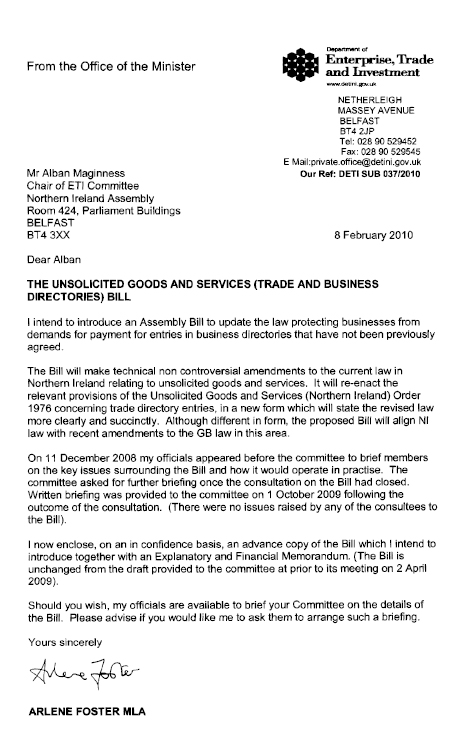
Appendix 4
Research Papers
Research and Library Services

April 2010
Unsolicited Services
(Trade and Business Directories) Bill
Eoin Murphy
This paper provides background to and an overview of the Unsolicited Services (Trade and Business Directories) Bill, which was introduced into the Assembly on the 23rd of March 2010. The purpose of the Unsolicited Services Bill is to bring Northern Ireland law into compliance with an EU Directive which has been in operation in England and Wales since 2005. The Bill is intended to remove provisions which the Department for Enterprise, Trade and Investment believes are burdensome and unnecessary, to remove anomalies and to ensure the compatibility of Northern Ireland law with obligations arising from membership of the European Union.
Library Research Papers are compiled for the benefit of Members of The Assembly and their personal staff. Authors are available to discuss the contents of these papers with Members and their staff but cannot advise members of the general public.
Summary
With the continuing development of electronic communication methods (such as the internet, email, etc.) it is necessary to update existing legislation to take these changes into account.
Previous legislation was enacted in order to protect businesses from unscrupulous directory publishers tricking them into paying for directory entries for which they had not asked and which they did not want.
In 2000, a new EU Directive was introduced which required member nations to update their legislation regarding this practice, taking into account electronic communication methods.
The Bill will make a number of technical and relatively minor changes to current law, replicating the changes made to the corresponding Great Britain (GB) law currently in operation, thereby bringing Northern Ireland (NI) law into line with the rest of the United Kingdom.
The Bill will restate the law in these areas, consolidating it into a more readily understandable form. The changes to the existing law will include:
Clause 1 – 6 restates provisions regarding the necessary conditions needed for directory publishers to require payment, removing the need for unnecessary cross referencing and consolidating and simplifying the text;
The Bill sets out provisions in the Schedule which are subordinate provisions for the purposes of section 4 of the Regulatory Reform Act. The Bill includes the power for the Department to amend these schedules by Statutory Rule;
The Schedule of the Bill mirrors the provisions of the schedule to the Regulatory Reform Order, although the details have been set out in a different sequence to match that of the Bill;
Clause 7 provides DETI with the power to amend the Schedule to the Bill by Order subject to negative resolution; and
Clause 8 (2) repeals Articles 5 and 6 of the 1976 Order as they are being replaced by the provisions of the proposed Bill. In addition, Article 2 (3) of the 1976 order is being amended as it needs to refer to the conditions in paragraph 4 of the Schedule to the proposed Bill.
Table of Contents
Equivalent Legislation in Great Britain
The Regulatory Impact Assessment
Introduction
The Unsolicited Services (Trade and Business Directories) Bill (henceforth referred to as “The Bill") is intended to re-enact, with amendments, certain provisions of the Unsolicited Goods and Services (Northern Ireland) Order 1976.
The original act was established to control the circumstances under which businesses could be charged for the publication of entries about them in directories. Prior to the 1976 Order, it had been possible for businesses to be tricked into paying for directory entries for which they had not asked nor wanted. Methods employed included asking businesses to check contact details on a form, with small print located elsewhere in the document stating they were agreeing to publication of their details and the practice of issuing invoices for entries in fictitious directories, with threats of legal action if the invoice was not paid.
The 1976 Act legislated against these activities and subsequently requires updating to take account of Article 9 (1) of Directive 2000/31/EC of the European Parliament and of the Council and to bring Northern Ireland’s legislation into line with that of the rest of the United Kingdom.
Background
The Bill is intended to remove provisions within the 1976 Act which the Department for Enterprise, Trade and Investment believes are burdensome and unnecessary, to remove anomalies and to ensure the compatibility of Northern Ireland law with obligations arising from membership of the European Union.
In particular the Bill will ensure that the law on unsolicited services will comply with Article 9 (1) of Directive 2000/31/EC of the European Parliament and of the Council on certain legal aspects of information society services, in particular electronic commerce, in the Internal Market (the E-Commerce Directive). Throughout the UK, Article 9 (1) is being implemented on an ad hoc basis where legislation is identified which contravenes its requirements[1].
The Bill restates Northern Ireland law in this area whilst replicating changes made to corresponding law in Great Britain.
The public consultation took place over the normal twelve week period and was completed on the 28th August 2009.
On the 25th February 2010, Executive Agreement for the Bill to move forward was given and the Bill was drafted. A further department brief to the Committee for Enterprise, Trade and Investment was made on the 4th March 2010 with regards to the drafted Bill, and the Bill was introduced to the Assembly on the 23rd March 2010.
Results of Consultation
The Department’s Consultation sought responses from a number of organisations on issues concerning the overall objectives and framework of the Unsolicited Services Bill.
As well as seeking the views of the general public, the consultation was also issued to the Data Publishers Association, the Periodical Publishers Association, Yell Limited and the European Association of Directory Publishers. Following discussion with the Committee for Enterprise, Trade and Investment a number of additional organisations were consulted including the NI Chamber of Commerce, the Institute of Directors, the Federation of Small Businesses and the Confederation of British Industries (NI branches).
Only ten organisations responded to the consultation, with seven of these stating they had no comments.
Of the three organisations that provided comments, the Federation of Small Businesses Northern Ireland Policy Unit:
“…welcomed the simplification of the law, the elimination of burdensome and unnecessary procedures and the bringing of NI law into line with that in GB[2]."
The organisation went on to state that the Bill may provide an opportunity to raise awareness of the practices the Bill will provide protection under.
The other two respondents that provided comments, Antrim Borough Council and Ballymena Borough Council, welcomed the Bill.
The organisations which responded but which had no comment were:
- Institute of Directors (NI Branch);
- Limavady Borough Council;
- Disability Action;
- Executive Services Directorate OFMDFM;
- North South Ministerial Council OFMDFM;
- North Belfast Community Action Unit OFMDFM; and
- Northern Ireland Judicial Appointments Commission.
Equivalent Legislation in Great Britain
The Bill brings Northern Ireland into compliance with EU Directive 2000/31/EC which considered electronic commerce. The Bill aims to align the law in NI with that of Great Britain.
The legislation most applicable to the NI law is the Unsolicited Goods and Services Act 1971. This Act was amended in 2005 in Great Britain to bring it into compliance with the EU Directive by:
- The Regulatory Reform (Unsolicited Goods and Services Act 1971) (Directory Entries and Demands for Payment) Order 2005; and
- The Unsolicited Goods and Services Act 1971 (Electronic Commerce) (Amendment) Regulations 2005.
The Regulatory Reform Act altered the law which imposes requirements as to how agreements may be made for entries in directories. The order adds an additional method in which a person who has already agreed to an entry can have repeat or renewed listing.
Failure to comply with a method as laid out in the Act makes the charge for an entry unenforceable or recoverable, and the person claiming the charge will commit an offence if they demand payment, unless they believe that the requirements in the Act have been complied with.
In addition the Order establishes requirements that invoices and similar documents must comply with if they are not to be regarded under the Act as asserting a right to payment.
The second set of amendments to the Unsolicited Goods and Services Act 1971 brought GB law into compliance with Article 9 (1) of the Directive 2000/31/EC of the European Parliament in relation to electronic commerce and information society services.
The regulations amend Section 3 of the 1971 Act so that orders may be sent electronically provided certain specified requirements are met.
Purpose of the Bill
DETI states that the Unsolicited Services Bill will bring Northern Ireland law into line with that in GB and ensure compliance with Article 9(1) of the European Community’s e-commerce directive. The Bill is a technical, non-controversial measure. It will re-enact, with technical amendments, certain provisions of the Unsolicited Goods and Services (Northern Ireland) Order 1976. Those provisions control the circumstances in which businesses may be charged for the publication of entries about them in directories.[3]
The Bill is intended to enable businesses to improve efficiency by relaxing and simplifying arrangements for repeats and renewals of directory entries, arrangements for sending order forms electronically and requirements covering the form and content of invoices and other documents.
The Bill will update the law to reflect the modern and commercial realities of the directory publishing industry, while ensuring that the legislation continues to provide protection for businesses against a number of scams.
Overview of the Bill
The Bill will make a number of technical and relatively minor changes to the current law.
The Great Britain Statutory Instruments were constrained by the limited powers to make them contained in the Regulatory Reform Act 2001 and the European Communities Act 1972.
As the Bill is not similarly constrained it will restate the law in this area, with amendments similar to those made by the recent Great Britain Statutory Instruments, in a consolidated and more readily understood form. The proposed Bill largely follows the language of the Great Britain Statutory Instruments but is different in structure.
The proposed Bill will produce exactly the same legal effect as the GB Act as amended. DETI considers that anyone who complies with the law in GB will comply with the law in Northern Ireland as set out in the Bill.
Content of the Bill[4]
Clauses 1 to 6 of the Bill are equivalent to Section 3 of the 1971 GB Act as amended by the Great Britain Statutory Instruments. Section 3 covers:
- the general prohibition on charges unless one of four conditions is met;
- the details of each of these four conditions; and
- the offence of demanding payment without complying with one of these conditions.
Clauses 1 to 6 of the proposed Bill have restated these provisions separately.
This approach removes the need for unnecessary cross-referencing and the text has been consolidated and simplified.
Under Clause 7 of the Bill, the Department will have power to amend the Schedule to the Bill by Order subject to negative resolution. An Order under that clause may also make any necessary transitional provisions and amendments to provisions referred to in the Schedule.
The Schedule to the Bill sets out certain matters which are referred to in clauses 3, 4 and 5. It mirrors the provisions of the Schedule to Regulatory Reform (Unsolicited Goods and Services Act 1971) (Directory Entries and Demands for Payment) Order 2005 (S.I. 2005/55). The details have, however, been set out in a different sequence to match the sequence in which they occur in the Bill.
Clause 8(2) repeals Articles 5 and 6 of the 1976 Order as they are being replaced by the provisions of the proposed Bill. Article 2(3) of the 1976 Order is being amended because it will need to refer to the conditions in paragraph 4 of the Schedule to the Bill.
Importantly, the proposed Bill will produce exactly the same legal effect as the GB Act as amended[5].
Options Considered
To ensure compliance with Article 9 of the E-Commerce Directive, an amendment to the law is required to create an electronic equivalent of Business Order Forms. The risk of not proceeding would be an infraction of European Community law, and could be subject to infraction proceedings.
Compliance with Article 9 could have been achieved by the Department making Regulations under section 2(2) of the European Communities Act 1972 to amend the 1976 Order. Section 2(2) allows secondary legislation to amend primary legislation, a process not normally allowed for within UK law. Section 2 (2) is only applicable when implementing European Union obligations.
However, it would not have been possible to amend the 1976 Order in the same way the 1971 Act was amended by the Regulatory Reform (Unsolicited Goods and Services Act 1971) (Directory Entries and Demands for Payment) Order 2005 (the Regulatory Reform Order"). This Order was made under the Regulatory Reform Act 2001 which does not apply to Northern Ireland devolved legislation[6].
The provisions of the “Regulatory Reform Order" relaxed the existing requirements when clients renew or extend existing contracts for entries in a directory. It also simplified requirements as to the form and content of certain documents relating to contracts for directory entries. The Department wishes to ensure that NI businesses have the same benefits and protections in this area of law as in the rest of the United Kingdom. To achieve the same effect in Northern Ireland it is necessary to proceed by introducing a Bill into the Assembly. Accordingly it was decided to proceed with a Bill combining similar amendments to the Regulatory Reform Order with the amendments necessary to ensure compliance with Article 9 of the E -Commerce Directive.
Costs
If enacted, the Bill is not expected to lead to any increase in public expenditure or public sector staffing. The legislation on unsolicited goods and services is currently being enforced by the Department’s Trading Standards Service and the amendments made by the proposed Bill are unlikely to lead to any significant increase in enforcement activity[7].
For businesses, there is the possibility of costs from amending business procedures to take advantage of a new method for authorising a directory entry. However, such costs are likely to be low as few directory transactions use the Business Order Form Method.
In addition, directory publishers might also incur costs initially by taking advantage of this new authorisation method in order to make longer term savings. Again, these costs are likely to be low and are not expected to lead Directory publishers to change their business practices[8].
Human Rights Issues
There are no human rights issues. The Bill re-enacts, with minor technical amendments, the existing law in this field[9].
Equality Impact Assessment
Equality screening did not reveal any negative impact on any of the groups set out in section 75 of the Northern Ireland Act 1998[10].
The Regulatory Impact Assessment
The Bill would ensure compliance with the E-Commerce Directive, remove a potential obstacle to contracting by electronic means in the directory publishing field and provide a quick and cost-effective means for advertisers to contract for a directory entry should they choose to use it.
DETI considers that the Bill strikes the right balance, as with the GB legislation[11], of: removing obstacles to contracting by electronic means; ensuring compliance with the E-Commerce Directive; and ensuring, as far as possible, business advertisers do not incur costs due to scams[12].
[1] DETI Consultation on Proposals for an Unsolicited Services (Trade and Business Directories) Bill 2009
[2] DETI 4th March 2010 Briefing for the ETI Committee on result of consultation which ended on 28 August 2009
[3] Hansard, Minutes of Evidence, Unsolicited Services Bill, p.2 http://archive.niassembly.gov.uk/record/Hansard_enterprise_trade_investment.htm (first accessed 13th April 2010)
[4] ‘Debt Relief, Explanatory and Financial Memorandum.’ NIA Bill http://archive.niassembly.gov.uk/legislation/primary/2009/niabill12_09_efm.htm
[5] DETI Consultation on Proposals for an Unsolicited Services (Trade and Business Directories) Bill 2009
[6] Based on discussions with DETI representatives
[7] DETI Consultation on Proposals for an Unsolicited Services (Trade and Business Directories) Bill 2009
[8] Ibid
[9] Ibid
[10] Ibid
[11] Department of Trade and Industry Explanatory Memorandum to the: The Unsolicited Goods and Services Act 1971 (Electronic Commerce) (Amendment) Regulations 2005
[12] DETI Consultation on Proposals for an Unsolicited Services (Trade and Business Directories) Bill 2009
Appendix 5
List of Witnesses
Mr John Hinds Department of Enterprise, Trade and Investment
Ms Deirdre Dempsey Department of Enterprise, Trade and Investment
Mr Philip McLenaghan Department of Enterprise, Trade and Investment
Mr Patrick Neill Department of Enterprise, Trade and Investment

